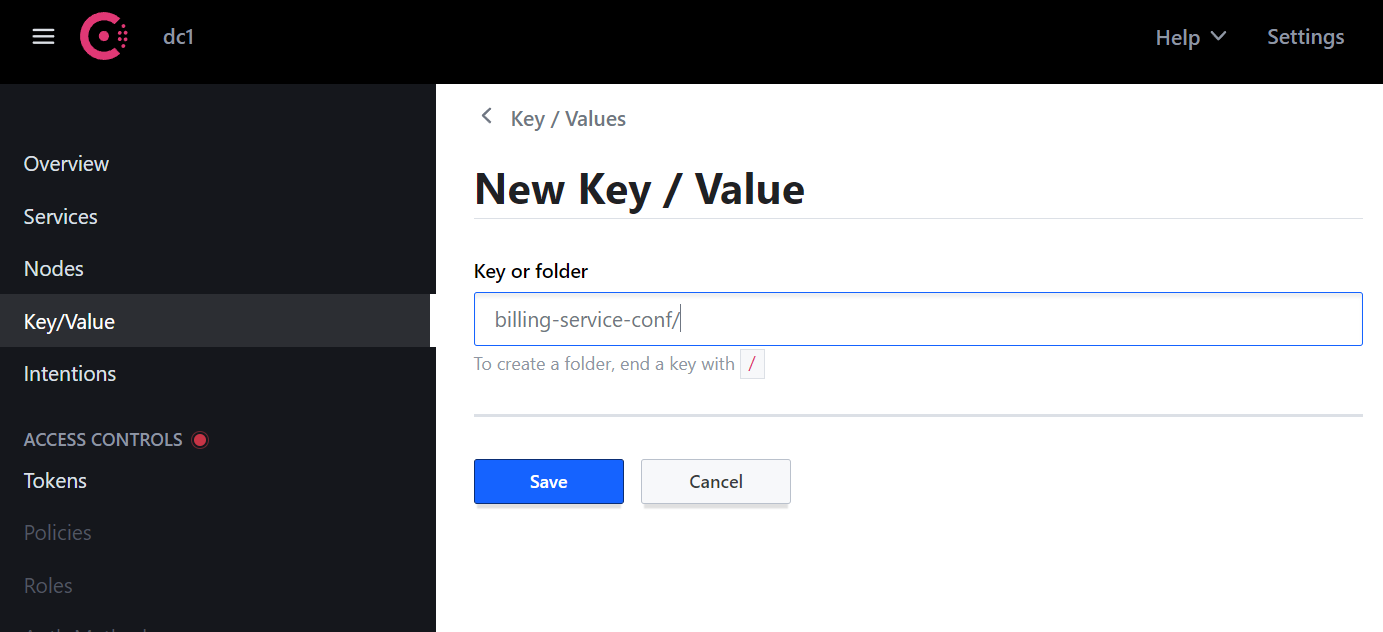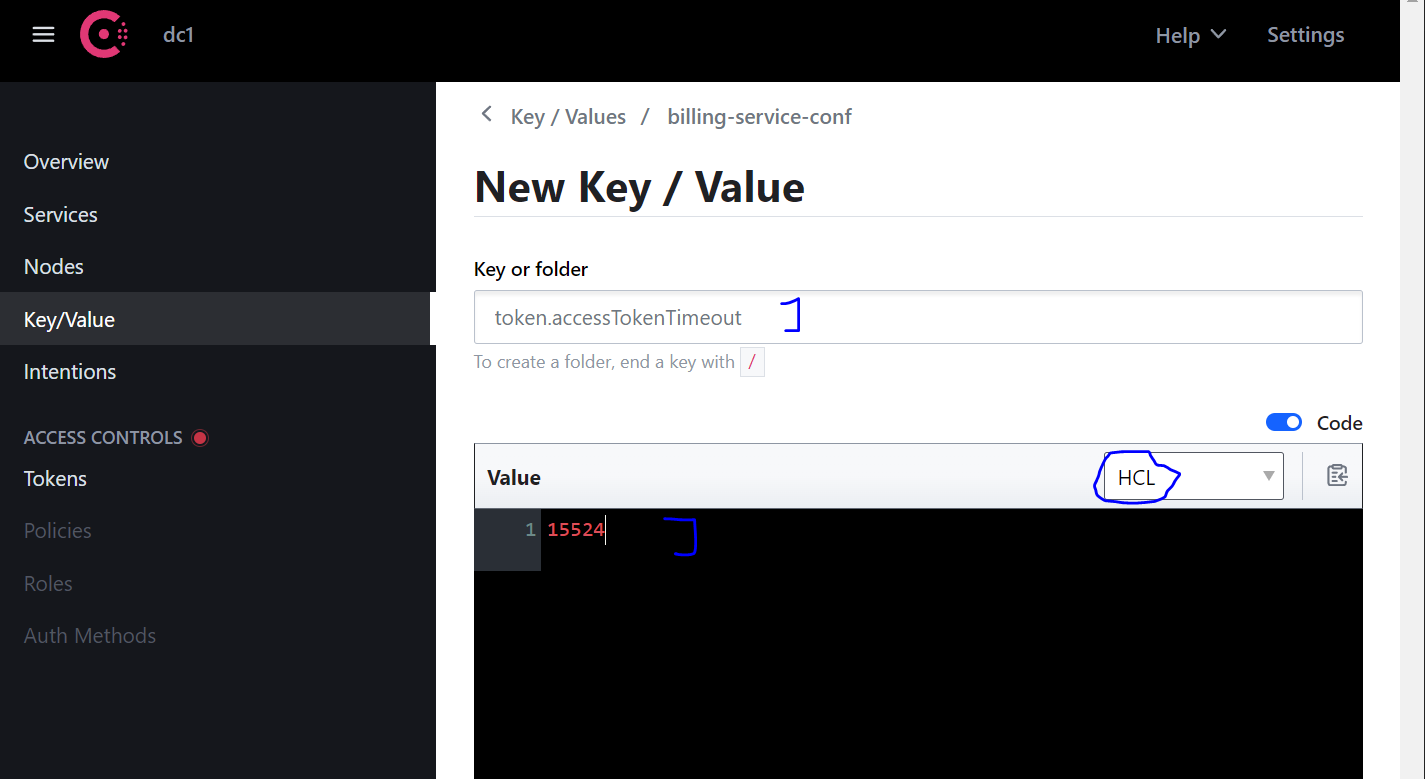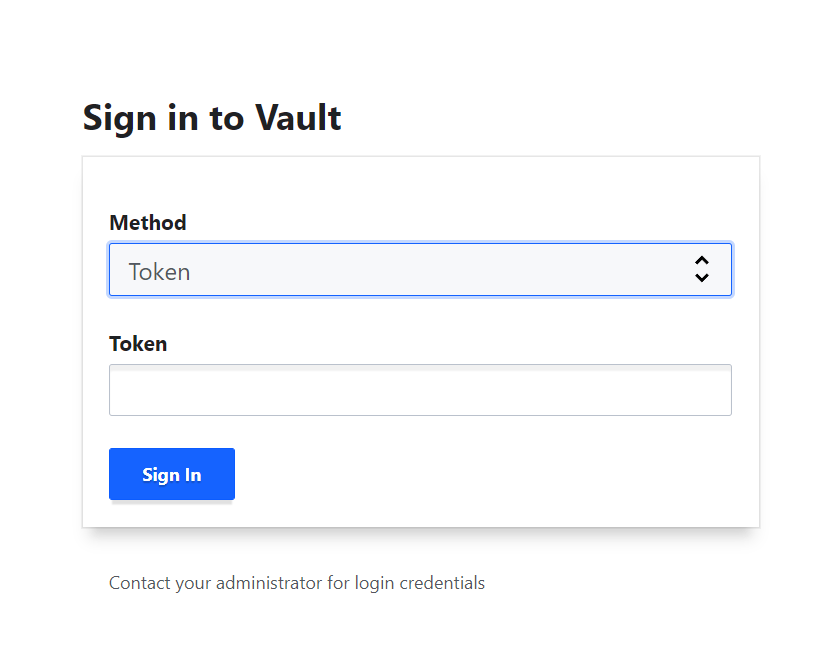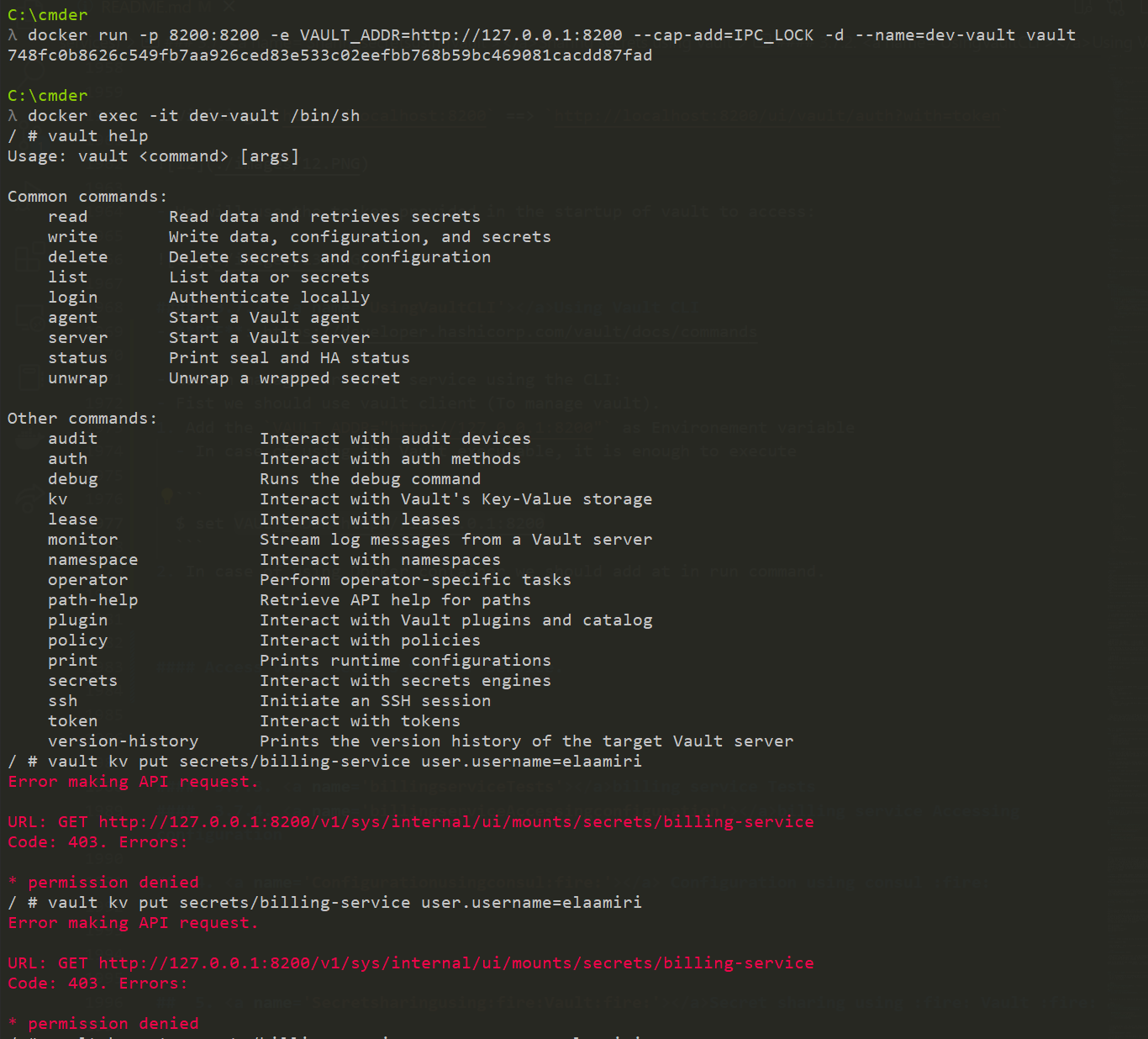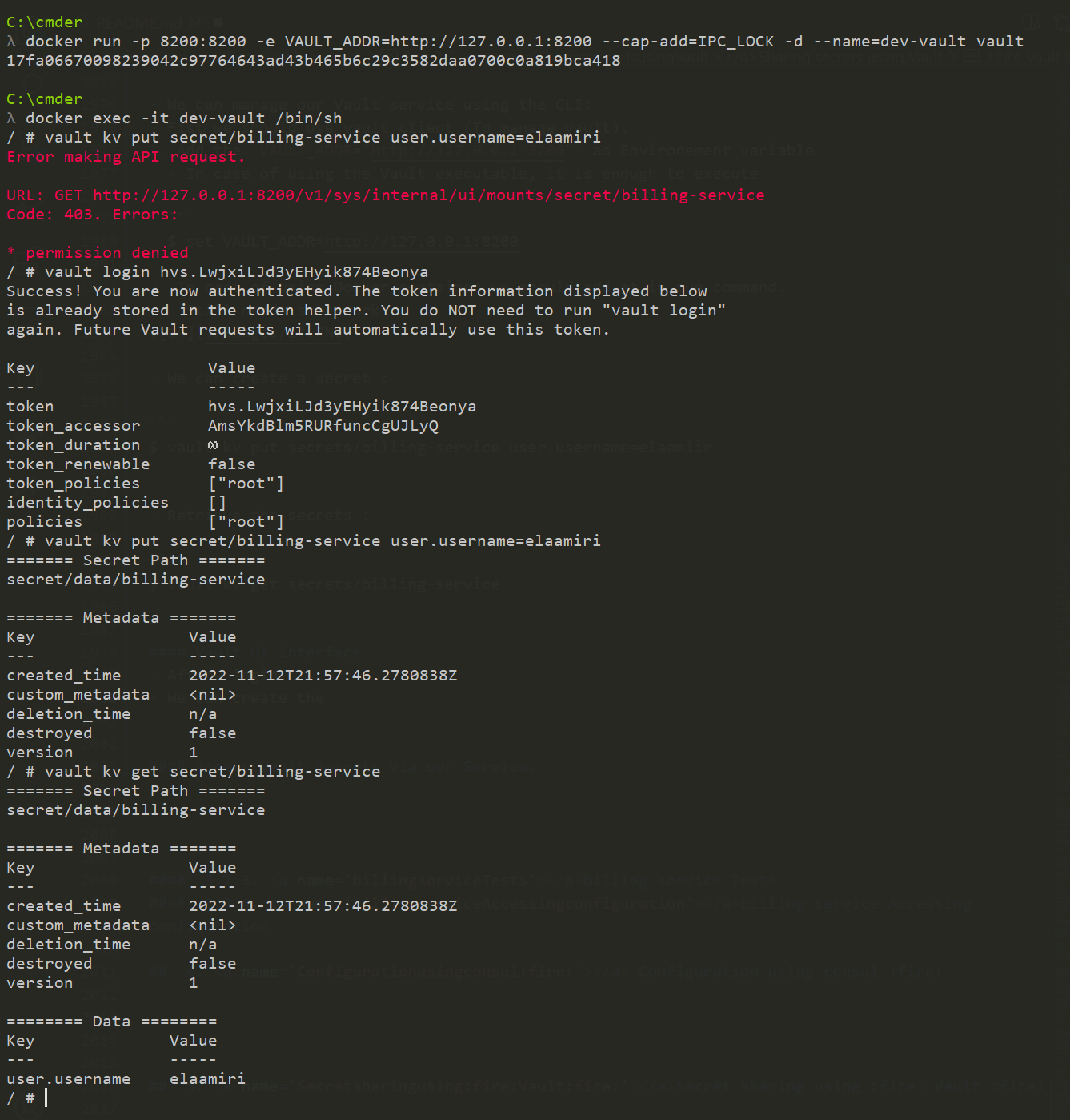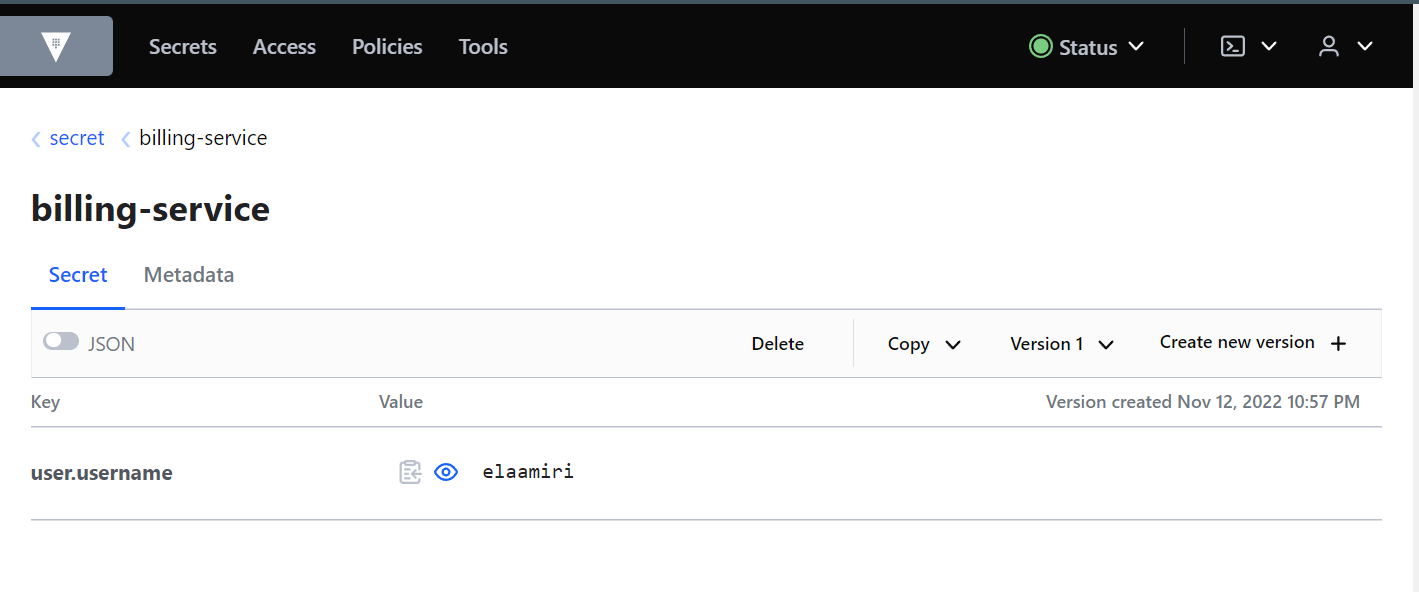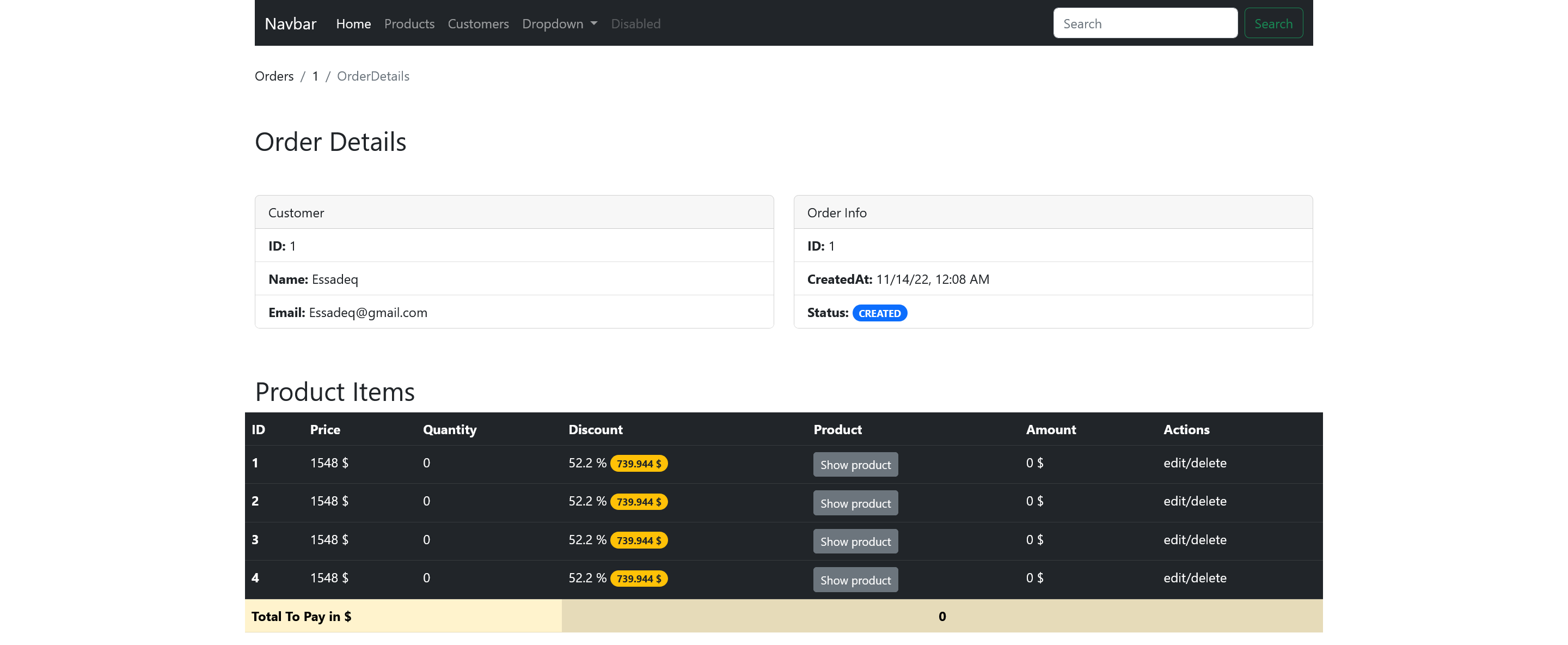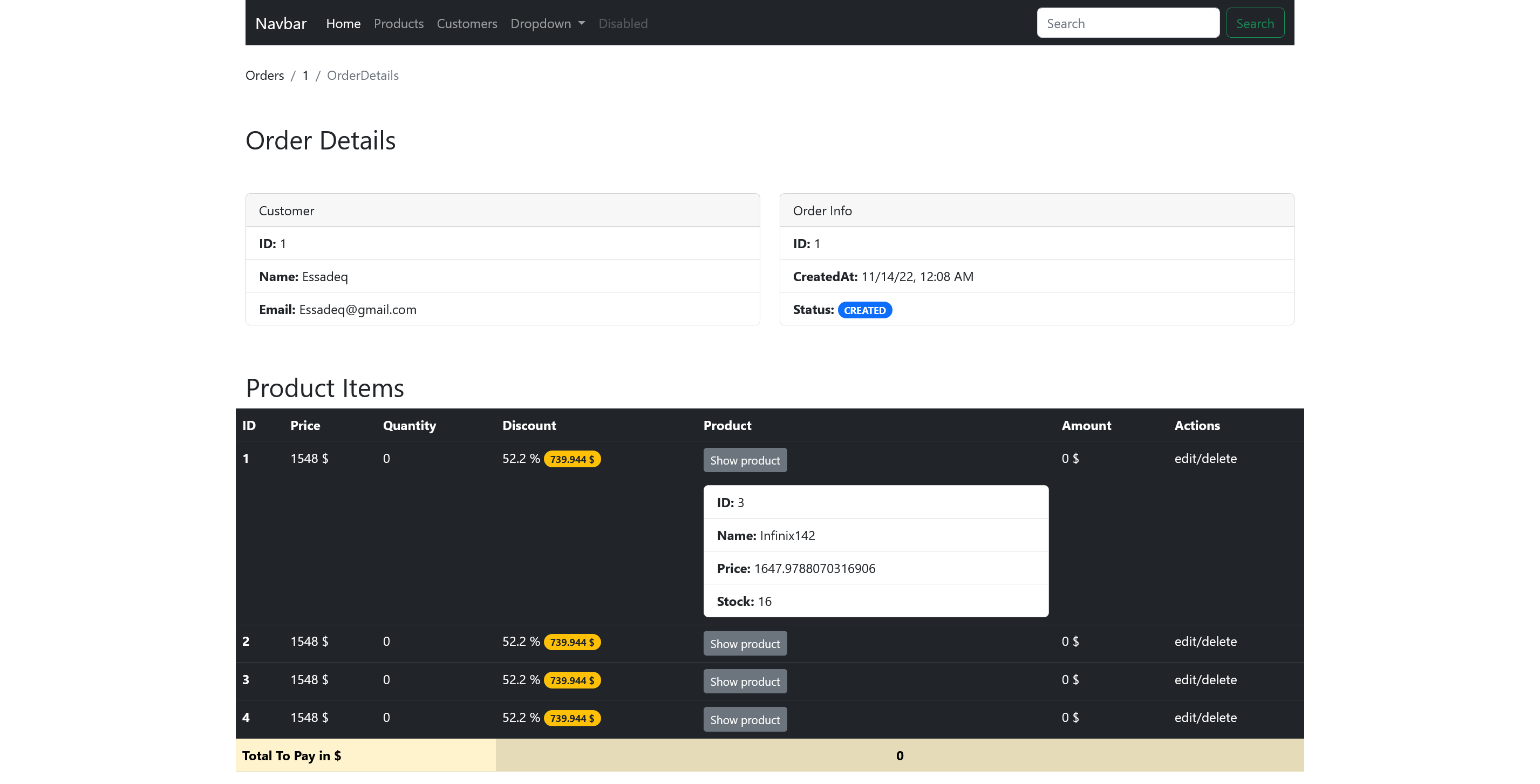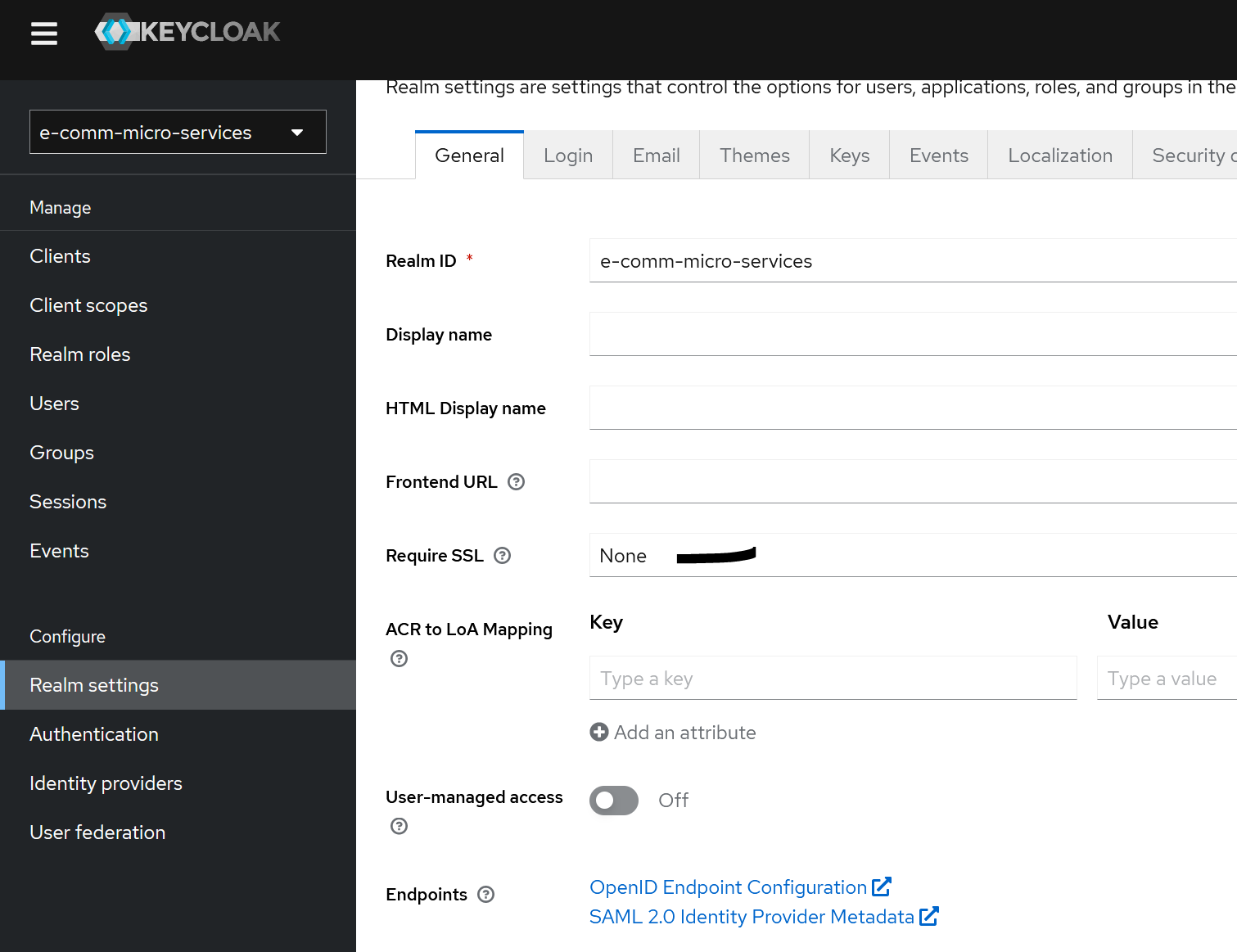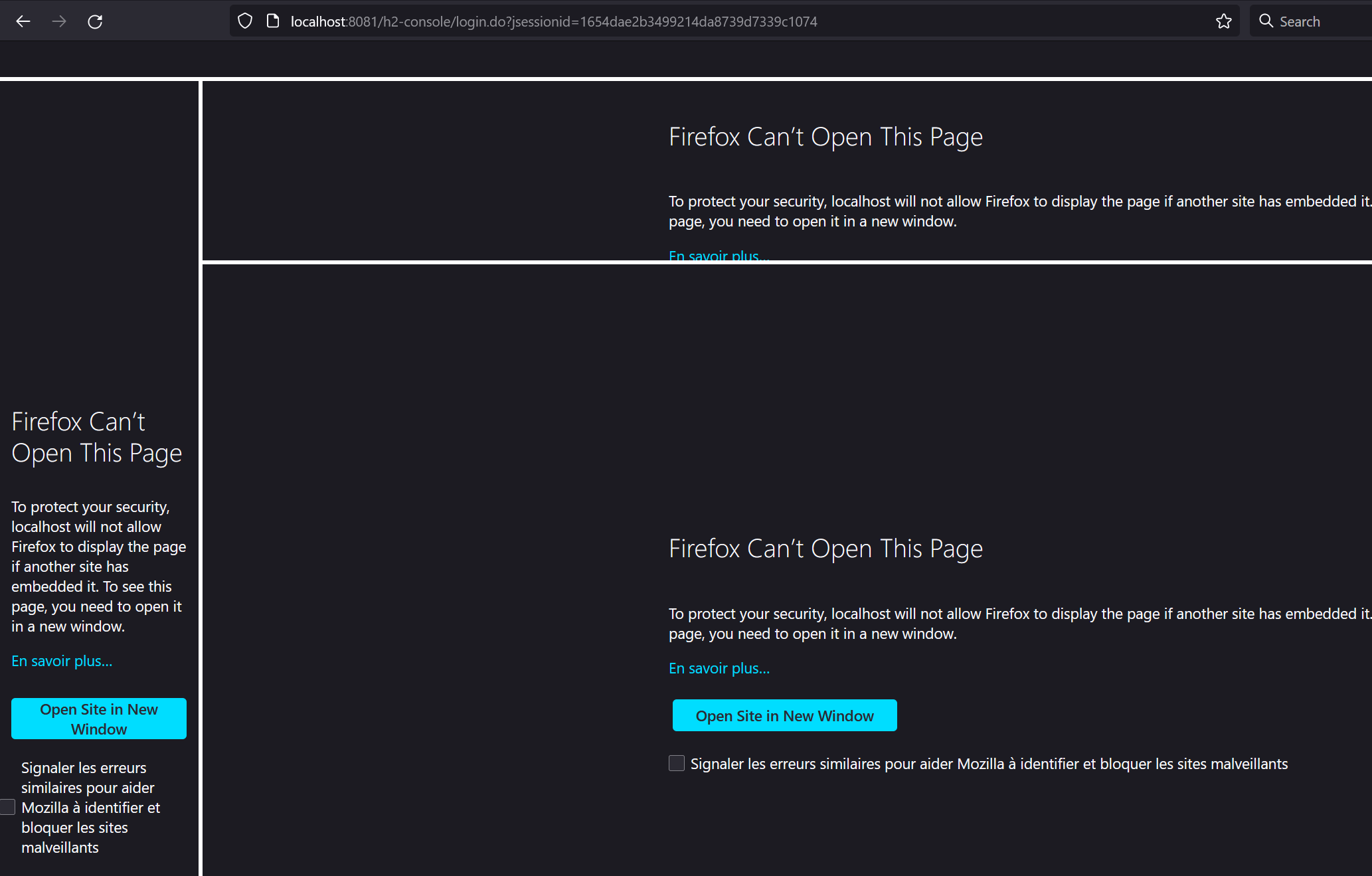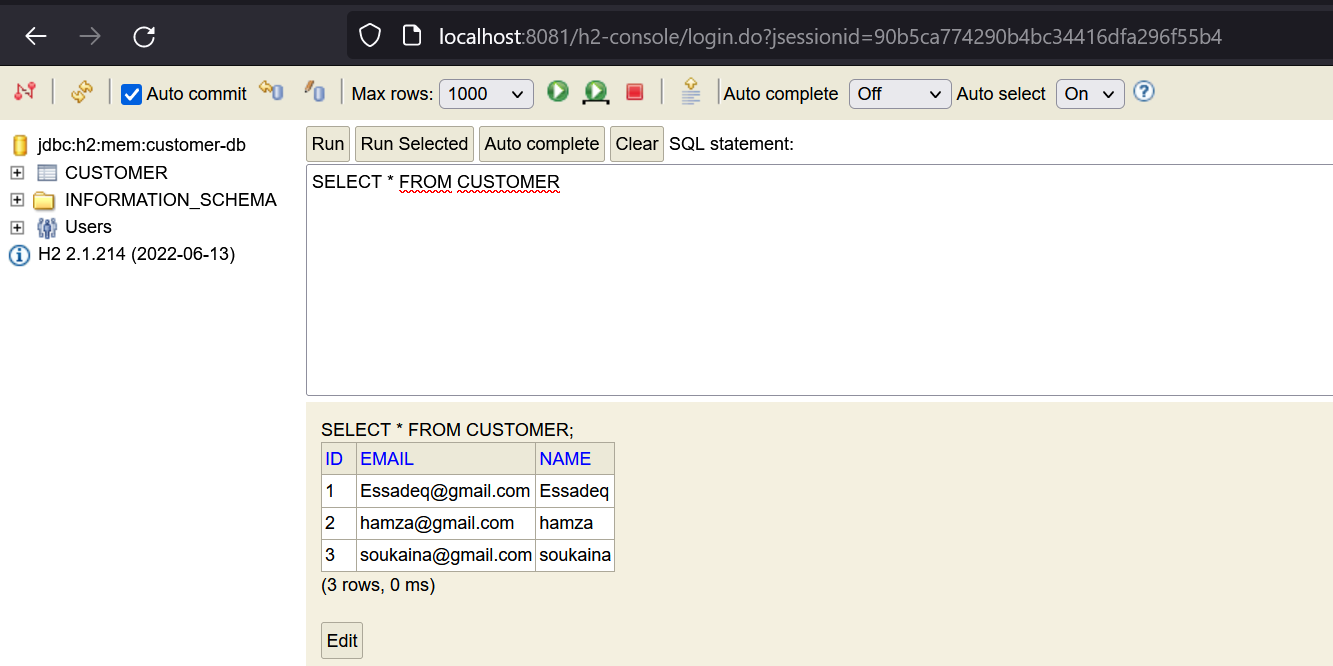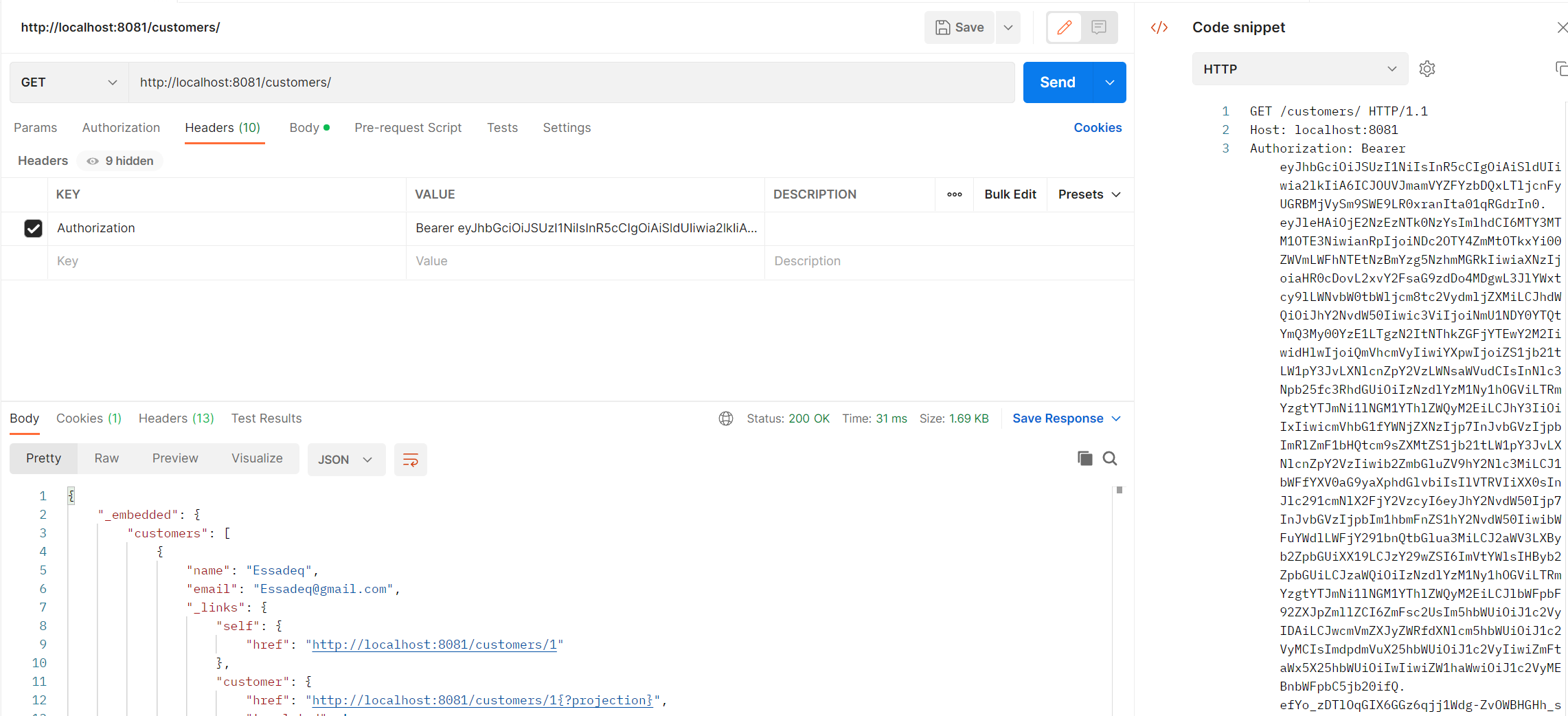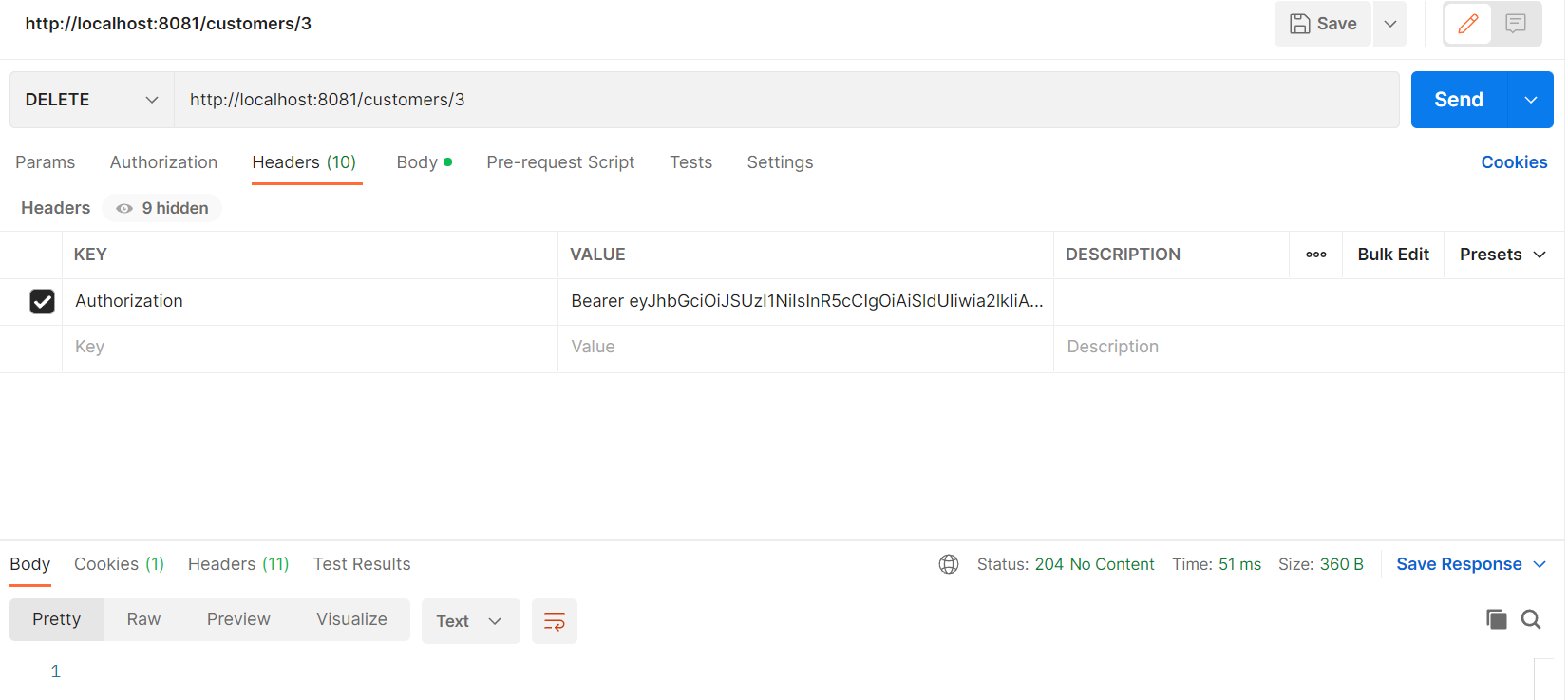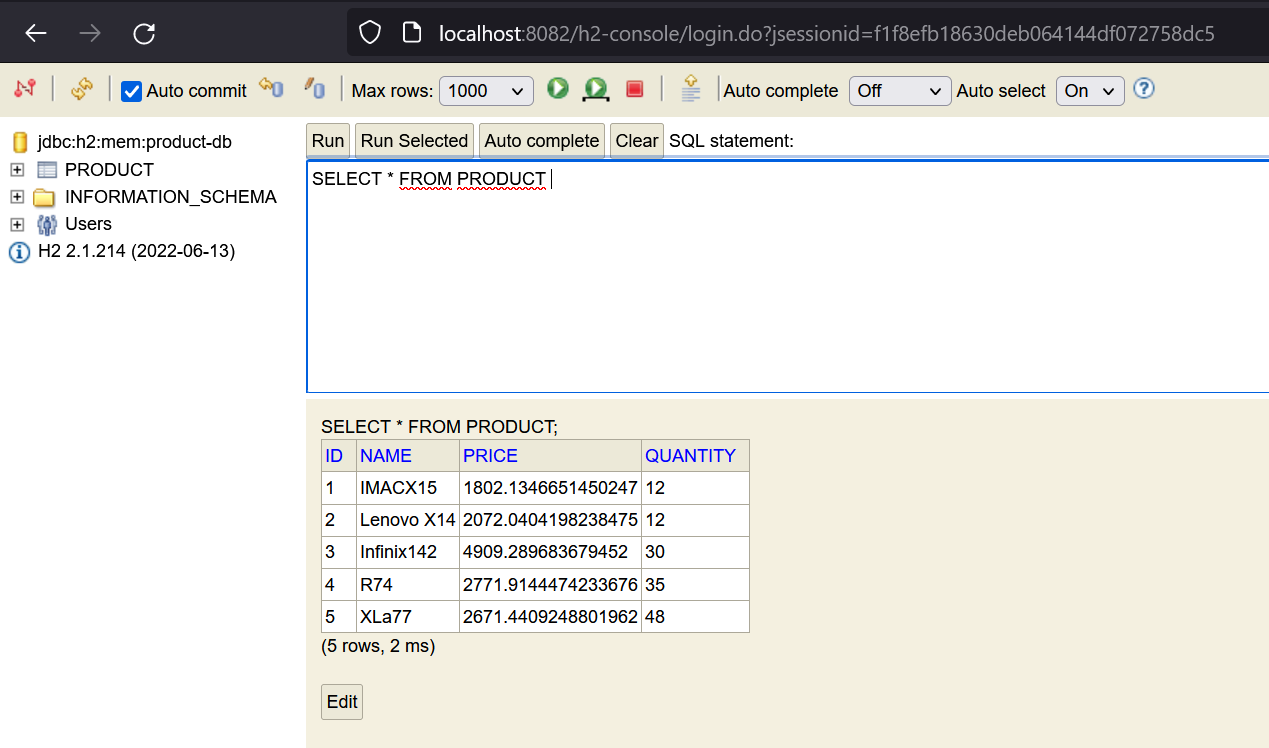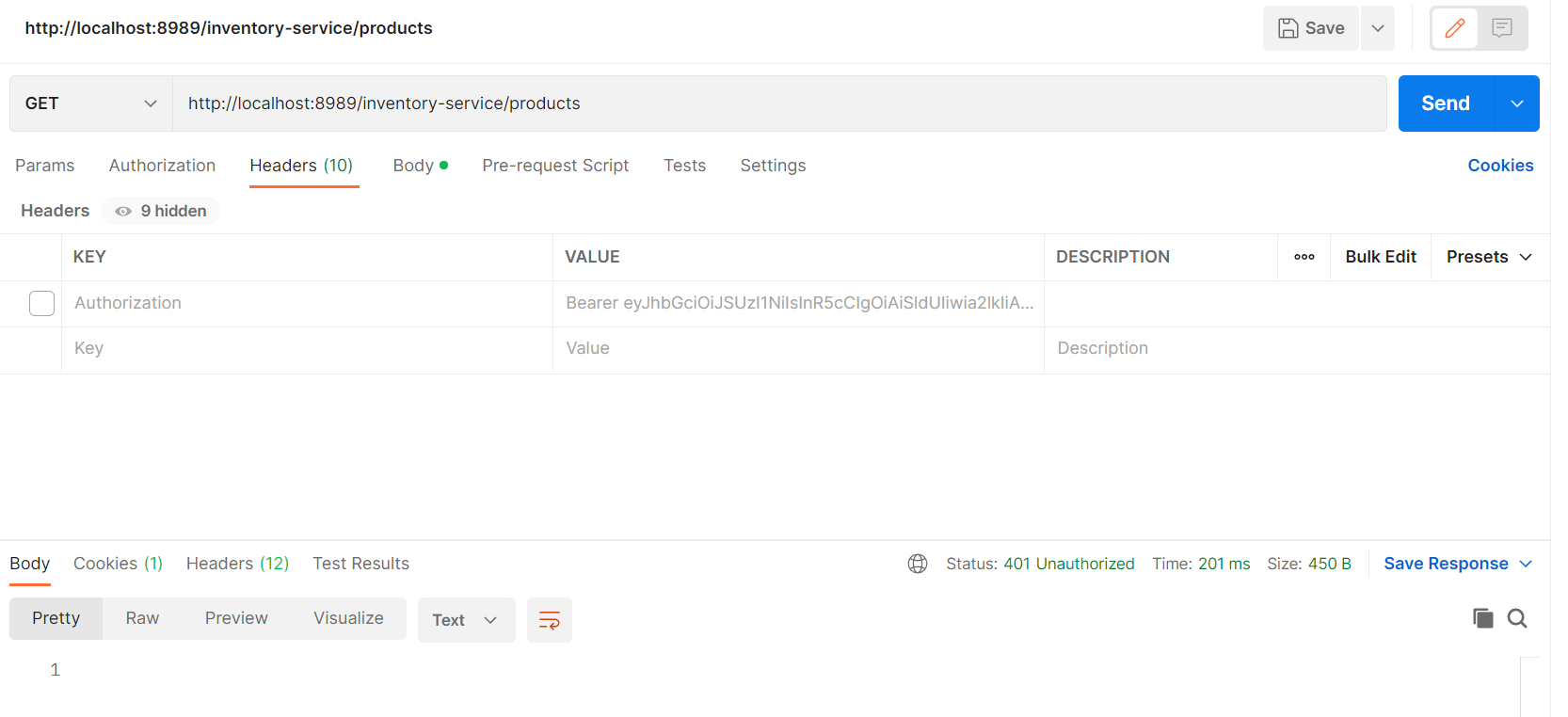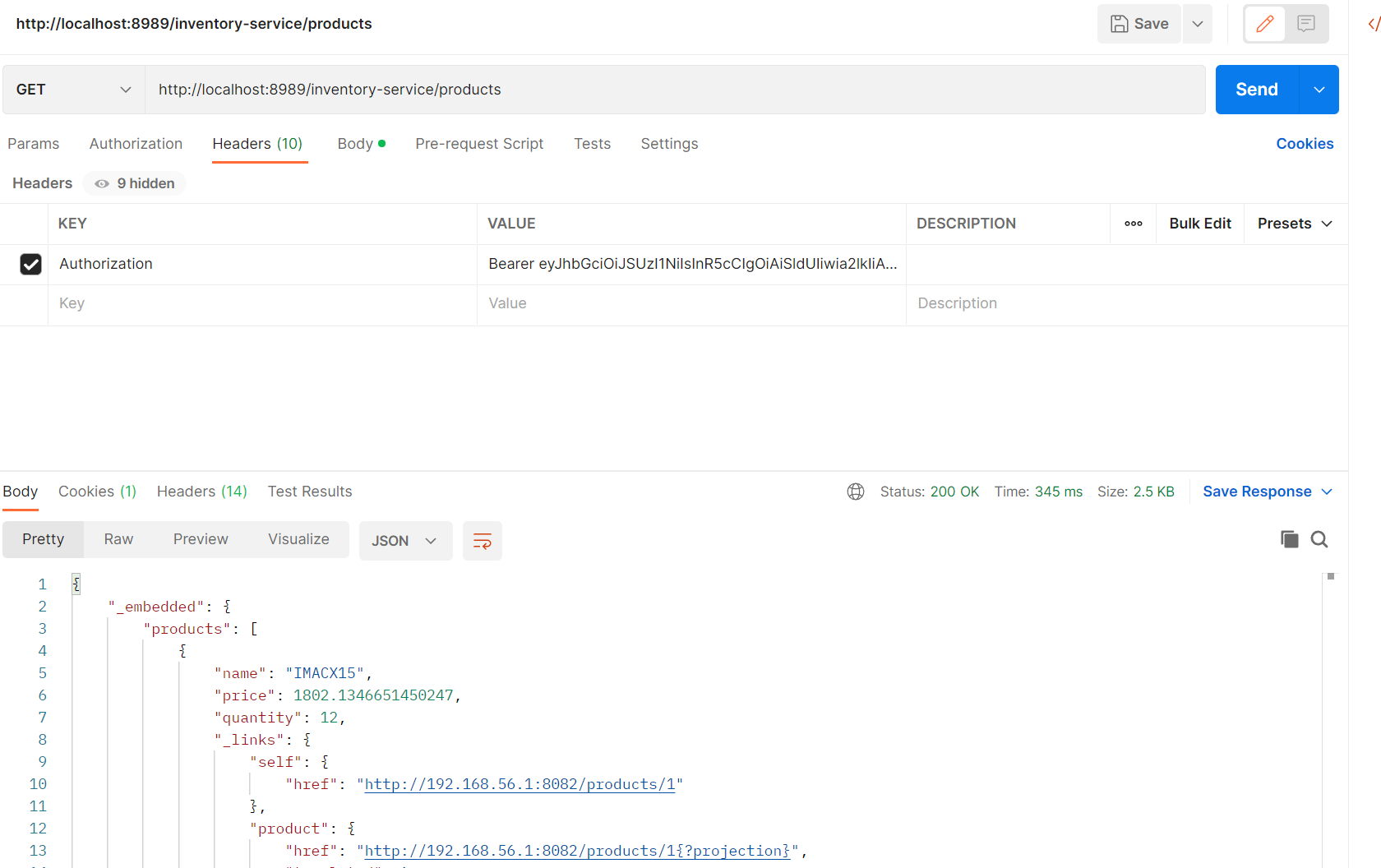-
- 2.1. Consul Discovery service
- 2.2. Configuration service
- 2.2.1. Config service dependencies
- 2.2.2. Activating config service
- 2.2.3. Config service properties
- 2.2.4. Config service repo and files
- 2.2.5. Tests
- 2.2.6. How to use it ?
- 2.3. Gateway service
- 2.3.1. Gateway service Dependencies
- 2.3.2. Gateway service properties
- 2.3.3. Dynamic routing
- 2.3.4. Gateway test
-
- 3.1. Customer service
- 3.1.1. Customer service Dependencies
- 3.1.2. Customer service properties
- 3.1.3. Customer service RestRepository
- 3.1.4. Customer service Projections
- 3.1.5. Customer service Tests
- 3.1.6. Customer service Accessing configuration
- 3.2. Inventory service
- 3.2.1. Inventory service Dependencies
- 3.2.2. Inventory service properties
- 3.2.3. Inventory service RestRepository
- 3.2.4. Inventory service Projections
- 3.2.5. Inventory service Tests
- 3.3. Order service
- 3.4. Consul What is happening ?
- 3.5. OpenFeign Logging (Journalisation)
- 3.6. billing service
- 3.7. Sharing secrets using Vault
- 3.7.1. Vault installing
- 3.7.2. Using Vault
- 3.7.3. Vault CLI
- 3.7.4. Vault UI interface
- 3.7.5. Access Vault Secrets via our Service.
- 3.7.6. Adding Vault Secrets via our Service.
- 3.1. Customer service
Just to make thing easy to navigate between the microservices without the need to open a new window for each one we can in Intellij Idea
create a project(empty one).- Add the projects as modules to the empty project
Add new Module from existing source.
We will create it as a micro-service, because it is available as a jar executable file or, a docker image
-
Website : https://www.consul.io/
-
As jar file [v1.13.3 (latest version 2022-11-06)]: https://releases.hashicorp.com/consul/1.13.3/consul_1.13.3_windows_386.zip
-
As Docker image: https://hub.docker.com/_/consul
-
Pulling the image :
$ docker pull consul
- Run it in dev mode (UI):
$ docker run -d -p 8500:8500 -p 8600:8600/udp --name=my-consul consul agent -server -ui -node=server-1 -bootstrap-expect=1 -client=0.0.0.0
- Visiting
http://localhost:8500(http://localhost:8500/ui/dc1/services)
- Consul is reactive : means that if it is rebooted, the services detect it and register automatically
- Config Server
- Spring boot Actuator
- Consul Discovery
@SpringBootApplication
@EnableConfigServer
public class ECommConfigServiceApplication {
public static void main(String[] args) {
SpringApplication.run(ECommConfigServiceApplication.class, args);
}
}server.port=8888
spring.application.name=config-service
## referring to a local github repo to control the config versions
spring.cloud.config.server.git.uri=file:///C:/Users/elaam/IdeaProjects/microservices-architecture-spring-cloud-use-case/e-comm-config-repo- Above the path
pathis refering to the configuration repository that we use to store the configuration. - We used a local path (file protocol), but we can use any other way to access our config(remote repo for example...).
- It should be an external repository (Outside the microservice)
- And it should be a git repostory to follow and control the configuration history (versionning)|[Detecting changes].
- We can initialize the git repo by
$ git init - The repo holds the global config, which is shared between all the microservices and custom congif for each one we want :
- We can also create a config file for the developement and one other for production and other for test for example (
Custom config files for each environment)
- Here our config-service is on the consul dashboard .But, there is aproblem (Exception):
... org.springframework.cloud.config.server.environment.NoSuchLabelException: No such label: master ...
- Solution : we sould just
git addour files andgit committhem. - The service will be registred implicitlly to consul, but we can force that with :
@SpringBootApplication
@EnableConfigServer
@EnableDiscoveryClient // Enable Register to discovery server
public class ECommConfigServiceApplication {
public static void main(String[] args) {
SpringApplication.run(ECommConfigServiceApplication.class, args);
}
}- Now we can access the configuration via
http://localhost:8888/<service-name>/<environment> - Here the result of visiting
http://localhost:8888/customer-service/dev:
{
"name": "customer-service",
"profiles": [
"dev"
],
"label": null,
"version": "dec25c8ed68c614619d3a7249f397c8842eb004a",
"state": null,
"propertySources": [
{
"name": "file:///C:/Users/elaam/IdeaProjects/microservices-architecture-spring-cloud-use-case/e-comm-config-repo/file:C:\\Users\\elaam\\IdeaProjects\\microservices-architecture-spring-cloud-use-case\\e-comm-config-repo\\application.properties",
"source": {
"global.parmas.globlaName": "e-comm-enset"
}
}
]
}- We can return
default,dev,prod... configuration just by changing the<environement>
- Visit
http://localhost:8888/inventory-service/dev
{
"name": "inventory-service",
"profiles": [
"dev"
],
"label": null,
"version": "07c770e67a73facb14e6998017faa925b267dc77",
"state": null,
"propertySources": [
{
"name": "file:///C:/Users/elaam/IdeaProjects/microservices-architecture-spring-cloud-use-case/e-comm-config-repo/file:C:\\Users\\elaam\\IdeaProjects\\microservices-architecture-spring-cloud-use-case\\e-comm-config-repo\\inventory-service-dev.properties",
"source": {
"inventory.params.inv1": "4500"
}
},
{
"name": "file:///C:/Users/elaam/IdeaProjects/microservices-architecture-spring-cloud-use-case/e-comm-config-repo/file:C:\\Users\\elaam\\IdeaProjects\\microservices-architecture-spring-cloud-use-case\\e-comm-config-repo\\application.properties",
"source": {
"global.parmas.globlaName": "e-comm-enset"
}
}
]
}- Visit
http://localhost:8888/inventory-service/prod
{
"name": "inventory-service",
"profiles": [
"prod"
],
"label": null,
"version": "07c770e67a73facb14e6998017faa925b267dc77",
"state": null,
"propertySources": [
{
"name": "file:///C:/Users/elaam/IdeaProjects/microservices-architecture-spring-cloud-use-case/e-comm-config-repo/file:C:\\Users\\elaam\\IdeaProjects\\microservices-architecture-spring-cloud-use-case\\e-comm-config-repo\\inventory-service-prod.properties",
"source": {
"inventory.params.inv1": "4500"
}
},
{
"name": "file:///C:/Users/elaam/IdeaProjects/microservices-architecture-spring-cloud-use-case/e-comm-config-repo/file:C:\\Users\\elaam\\IdeaProjects\\microservices-architecture-spring-cloud-use-case\\e-comm-config-repo\\application.properties",
"source": {
"global.parmas.globlaName": "e-comm-enset"
}
}
]
}- Visiting :
http://localhost:8888/application/default - Returns the global config
{
"name": "application",
"profiles": [
"default"
],
"label": null,
"version": "07c770e67a73facb14e6998017faa925b267dc77",
"state": null,
"propertySources": [
{
"name": "file:///C:/Users/elaam/IdeaProjects/microservices-architecture-spring-cloud-use-case/e-comm-config-repo/file:C:\\Users\\elaam\\IdeaProjects\\microservices-architecture-spring-cloud-use-case\\e-comm-config-repo\\application.properties",
"source": {
"global.parmas.globlaName": "e-comm-enset"
}
}
]
}- In the functional services, we have to add the ability to seach the config to the service
- The dependency
config clientwill help us in that. - We just use the property :
spring.config.import=optional:configserver:http://localhost:8888 - Now the service will seach its configuration in the config server via
http://localhost:8888 - See that in details here => customer service
- Spring Cloud Gateway
- Consul Discovery : to register in the dicovery service
- Spring boot Actuator
- Spring cloud Config
server.port=8989
spring.application.name=gateway-service
management.endpoints.web.exposure.include=*
## for the rest of properties search here
spring.config.import=optional:configserver:http://localhost:8888 // from where getting the config- Creating our
DiscoveryClientRouteDefinitionLocatorin the Application
@SpringBootApplication
public class ECommGatewayServiceApplication {
public static void main(String[] args) {
SpringApplication.run(ECommGatewayServiceApplication.class, args);
}
@Bean
DiscoveryClientRouteDefinitionLocator dynamicRouting(ReactiveDiscoveryClient reactiveDiscoveryClient,
DiscoveryLocatorProperties discoveryLocatorProperties){
return new DiscoveryClientRouteDefinitionLocator(reactiveDiscoveryClient, discoveryLocatorProperties);
}
}- Visiting :
http://localhost:8989/gateway-service/customer-service
{
"_links" : {
"customers" : {
"href" : "http://localhost:8081/customers{?page,size,sort}",
"templated" : true
},
"profile" : {
"href" : "http://localhost:8081/profile"
}
}
}- Visiting
http://localhost:8989/gateway-service/customer-service/customers:
{
"_embedded" : {
"customers" : [ {
"name" : "Essadeq",
"email" : "Essadeq@gmail.com",
"_links" : {
"self" : {
"href" : "http://localhost:8081/customers/1"
},
"customer" : {
"href" : "http://localhost:8081/customers/1"
}
}
}, {
"name" : "hamza",
"email" : "hamza@gmail.com",
"_links" : {
"self" : {
"href" : "http://localhost:8081/customers/2"
},
"customer" : {
"href" : "http://localhost:8081/customers/2"
}
}
}, {
"name" : "soukaina",
"email" : "soukaina@gmail.com",
"_links" : {
"self" : {
"href" : "http://localhost:8081/customers/3"
},
"customer" : {
"href" : "http://localhost:8081/customers/3"
}
}
} ]
},
"_links" : {
"self" : {
"href" : "http://localhost:8081/customers"
},
"profile" : {
"href" : "http://localhost:8081/profile/customers"
}
},
"page" : {
"size" : 20,
"totalElements" : 3,
"totalPages" : 1,
"number" : 0
}
}- getting the configuration by Visiting :
http://localhost:8989/gateway-service/customer-service/configParams
{"globalName":"e-comm-enset","c1":"defaultvalue3"}- Spring Web
- Spring Data Jpa
- H2 Database
- Lombok
- Rest Repositories
- Consul Discovery : to register in the dicovery service
- Config client : to find its configuration
- Spring boot Actuator
server.port=8081
spring.application.name=customer-service
management.endpoints.web.exposure.include=*
spring.config.import=optional:configserver:http://localhost:8888 // from where getting the config
- The Customer entity
@Entity
@Data @AllArgsConstructor @NoArgsConstructor
@Builder
public class Customer {
@Id
@GeneratedValue(strategy = GenerationType.IDENTITY)
private Long id;
private String name;
private String email;
}- the Customer rest repo
@RepositoryRestResource
public interface CustomerRepository extends JpaRepository<Customer, Long> {
}- CustomerProjection
@Projection(name = "fullCustomer", types = Customer.class)
public interface CustomerProjection {
Long getId();
String getName();
String getEmail();
}-
🔥 Does not return what should be returned (No Ids there) when visiting :
http://localhost:8989/gateway-service/customer-service/customers/1/?projection=fullCustomer!!! -
🔥 Solution :
How does Spring Data REST finds projection definitions? Any @Projection interface found in the same package as your entity definitions (or one of it’s sub-packages) is registered. You can manually register via RepositoryRestConfiguration.getProjectionConfiguration(). addProjection(…). In either situation, the interface with your projection MUST have the @Projection annotation.
- http://docs.spring.io/spring-data/rest/docs/current/reference/html/#projections-excerpts.projections
- Adding some customers at the begining :
@Bean
CommandLineRunner start(CustomerRepository customerRepository){
return args -> {
List.of("Essadeq", "hamza", "soukaina").forEach(s -> {
Customer customer = Customer.builder()
.name(s)
.email(String.format("%s@gmail.com", s))
.build();
customerRepository.save(customer);
});
};
}- The result
- Visiting :
http://localhost:8081/customers
{
"_embedded" : {
"customers" : [ {
"name" : "Essadeq",
"email" : "Essadeq@gmail.com",
"_links" : {
"self" : {
"href" : "http://localhost:8081/customers/1"
},
"customer" : {
"href" : "http://localhost:8081/customers/1"
}
}
}, {
"name" : "hamza",
"email" : "hamza@gmail.com",
"_links" : {
"self" : {
"href" : "http://localhost:8081/customers/2"
},
"customer" : {
"href" : "http://localhost:8081/customers/2"
}
}
}, {
"name" : "soukaina",
"email" : "soukaina@gmail.com",
"_links" : {
"self" : {
"href" : "http://localhost:8081/customers/3"
},
"customer" : {
"href" : "http://localhost:8081/customers/3"
}
}
} ]
},
"_links" : {
"self" : {
"href" : "http://localhost:8081/customers"
},
"profile" : {
"href" : "http://localhost:8081/profile/customers"
}
},
"page" : {
"size" : 20,
"totalElements" : 3,
"totalPages" : 1,
"number" : 0
}
}- Testing with projections , visiting :
http://localhost:8989/gateway-service/customer-service/customers/1/?projection=fullCustomer
{
"name" : "Essadeq",
"id" : 1,
"email" : "Essadeq@gmail.com",
"_links" : {
"self" : {
"href" : "http://DESKTOP-NH5SQQL:8081/customers/1"
},
"customer" : {
"href" : "http://DESKTOP-NH5SQQL:8081/customers/1{?projection}",
"templated" : true
}
}
}- That means that:
✈️ - Our Config server is working well
- Our Customer service is recognizing the configuration
- Everything here is fine
- We will try to access the config via a
CustomerConfigTestControllerclass inwebrepo.
package me.elaamiri.ecommcustomerservice.web;
...
@RestController
public class CustomerConfigTestController {
// Injecting the configuration values
@Value("${customer.params.c1}")
private String c1; // param
@Value("${global.parmas.globlaName}")
private String globalName; // param
@GetMapping("/configParams")
Map<String, String> getConfigParams(){
return Map.of("c1", c1, "globalName", globalName); //java 17
}
}- In a normal case where everything works as it should does, we should have this result when we visit :
http://localhost:8081/configParams
{"globalName":"e-comm-enset","c1":"defaultvalue"}-
By
@Value("${global.parmas.globlaName}")we inject the value of the paramglobal.parmas.globlaNamefrom the configuration files to the variableprivate String c1; -
The value
defaultvalueinjected toc1, because it is the default value and we did not specify the environment.. -
⚠️ be careful with the names of the config files, they should be the same as the services names. -
After every change in the configuration we should
addandcommitit, but, we can not see the changes : -
Solutions : 🔥🔥
-
Rerun the microservice (Not recommanded)
-
Use the
Refresh Actuator EndPointto refresh our service and so it loads the new config:- By this EndPoint we can demand to our service to do a
Refresh
- In our controller we add Actuator annotation
@RefreshScope
- Now when we change the config, we will able to refresh our srevice by sending a
POSTrequest:
POST http://localhost:8081/actuator/refresh
⚠️ Thre request will return a404error, so to avoid that we should add the propertymanagement.endpoints.web.exposure.include=*to the properties file of our service.- That Enables All Endpoints in Spring Boot Actuator via HTTP
- For more info : https://docs.spring.io/spring-boot/docs/2.1.11.RELEASE/reference/html/production-ready-endpoints.html
You can invoke the refresh Actuator endpoint by sending an empty HTTP POST to the client's refresh endpoint: http://localhost:/actuator/refresh .
- By this EndPoint we can demand to our service to do a
- Now when I refreshed the service using the
Actuator refresh endpoint, viaPOST http://localhost:8081/actuator/refreshI got the result :
HTTP/1.1 200 Content-Type: application/vnd.spring-boot.actuator.v3+json Transfer-Encoding: chunked Date: Sun, 06 Nov 2022 13:09:34 GMT Connection: close [ "config.client.version", "customer.params.c1" ]-
And the service recognized the new changes in the config service.
-
Actuator returns the changer params (because I changed
customer.params.c1and I commit it) -
HTTP file : HTTP FILE
-
--> Configuration à chaud 🇫🇷
-
-
For the
spring.datasource.url=jdbc:h2:mem:customer-db
spring.h2.console.enabled=true- We added them to the
customer-service.propertiesin the Config repo, so they will be managed by the config server.
- Spring Web
- Spring Data Jpa
- H2 Database
- Lombok
- Rest Repositories
- Consul Discovery : to register in the dicovery service
- Config client : to find its configuration
- Spring boot Actuator
server.port=8082
spring.application.name=inventory-service
management.endpoints.web.exposure.include=*
spring.config.import=optional:configserver:http://localhost:8888 // from where getting the config
- We should not forget to add
spring.datasource.url=jdbc:h2:mem:product-db
spring.h2.console.enabled=true
To the config files of Inventory service in the config server
inventory-service-dev.properties..⚠️ The config files should have the same name as the service(Name provided inspring.application.nameproperty)⚠️
-Product entity
@Entity
@Data @AllArgsConstructor @NoArgsConstructor @Builder
public class Product {
@Id
@GeneratedValue(strategy = GenerationType.IDENTITY)
private Long id;
private String name;
private double price;
private int quantity;
}- Product Rest repository
@RepositoryRestResource
public interface ProductRepository extends JpaRepository<Product, Long> {
}- Adding a projection
✈️ [Must be in the same package as the Entity or in a subpackage]
@Projection(name = "fullProduct", types = Product.class)
public interface ProductProjection {
public Long getId();
public String getName();
public double getPrice();
public int getQuantity();
}- Adding some test data
@SpringBootApplication
@EnableDiscoveryClient // not necessary
public class ECommInventoryServiceApplication {
public static void main(String[] args) {
SpringApplication.run(ECommInventoryServiceApplication.class, args);
}
@Bean
CommandLineRunner start(ProductRepository productRepository){
return args -> {
List.of("IMACX15", "Lenovo X14", "Infinix142", "R74", "XLa77").forEach(s -> {
Product product = Product.builder()
.name(s)
.price((new Random()).nextDouble(500, 5000))
.quantity((new Random()).nextInt(12,55))
.build();
productRepository.save(product);
});
};
}
}- Visiting :
http://localhost:8082/products/1
{
"name" : "IMACX15",
"price" : 1067.7846596528238,
"quantity" : 54,
"_links" : {
"self" : {
"href" : "http://localhost:8082/products/1"
},
"product" : {
"href" : "http://localhost:8082/products/1"
}
}
}- Visiting
http://localhost:8989/gateway-service/inventory-service/products/3| Gateway
{
"name" : "Infinix142",
"price" : 821.6061146943723,
"quantity" : 36,
"_links" : {
"self" : {
"href" : "http://DESKTOP-NH5SQQL:8082/products/3"
},
"product" : {
"href" : "http://DESKTOP-NH5SQQL:8082/products/3"
}
}
}- testing projection | visiting :
http://localhost:8989/gateway-service/inventory-service/products/2?projection=fullProduct
{
"name" : "Lenovo X14",
"id" : 2,
"price" : 1924.1412262701892,
"quantity" : 22,
"_links" : {
"self" : {
"href" : "http://DESKTOP-NH5SQQL:8082/products/2"
},
"product" : {
"href" : "http://DESKTOP-NH5SQQL:8082/products/2{?projection}",
"templated" : true
}
}
}- Spring Web
- Spring Data Jpa
- H2 Database
- Lombok
- Rest Repositories
- Consul Discovery : to register in the dicovery service
- Config client : to find its configuration
- Spring boot Actuator
server.port=8083
spring.application.name=order-service
management.endpoints.web.exposure.include=*
spring.config.import=optional:configserver:http://localhost:8888 // from where getting the config- Do not forget to add other properties to the config file in the repository
spring.datasource.url=jdbc:h2:mem:order-db
spring.h2.console.enabled=true
To the config files of Inventory service in the config server
-
Entities
-
Order
@Entity
@Table(name = "orderTable")
@Data @AllArgsConstructor @NoArgsConstructor @Builder
public class Order {
@Id
@GeneratedValue(strategy = GenerationType.IDENTITY)
private Long id;
private Date createdAt;
private OrderStatus orderStatus;
private Long CustomerID;
@OneToMany(mappedBy = "order")
private List<ProductItem> productItemList;
@Transient
private Customer customer;
}- ProductItem
@Entity
@Data
@AllArgsConstructor @NoArgsConstructor @Builder
public class ProductItem {
@Id
@GeneratedValue(strategy = GenerationType.IDENTITY)
private Long id;
private double price;
private int quantity;
private double discount;
private Long productID;
@ManyToOne
private Order order;
@Transient // not to be persistent
private Product product;
}-
They are related to each other by a bidirectional relation
-
To maximize the visibility of data (Have Customer and Product details) we added 2 models but they will not be persistent.
-
Product Model
@Data
@AllArgsConstructor
@NoArgsConstructor
@Builder
public class Product {
private Long id;
private String name;
private double price;
private int quantity;
}- Customer Model
@Data
@AllArgsConstructor
@NoArgsConstructor
@Builder
public class Customer {
private Long id;
private String name;
private String email;
}- Repositories
@RepositoryRestResource
public interface OrderRepository extends JpaRepository<Order, Long> {
}@RepositoryRestResource
public interface ProductItemRepository extends JpaRepository<Order, Long> {
}- Adding the dependency
<!-- https://mvnrepository.com/artifact/org.springframework.cloud/spring-cloud-starter-openfeign -->
<dependency>
<groupId>org.springframework.cloud</groupId>
<artifactId>spring-cloud-starter-openfeign</artifactId>
</dependency>
<dependency>
<groupId>org.springframework.boot</groupId>
<artifactId>spring-boot-starter-hateoas</artifactId>
</dependency>
-
Spring HATEOAS (Hypertext as the Engine of Application State) : Eases the creation of RESTful APIs that follow the HATEOAS principle when working with Spring / Spring MVC.
-
Here is the CustomerRestClient using OpenFeing (in service layer)
-
To communicate with the Customer service
🚧 ❌ 🚧 ❌ 🚧 ❌ 🚧
@FeignClient(name = "customer-service")
public interface CustomerRestClientService {
@GetMapping("/customers/{id}?projection=fullCustomer")
public Customer getCustomerById(@PathVariable Long id);
@GetMapping("/customers?projection=fullCustomer")
public List<Customer> getCustomers();
}- The InventoryRestClient Service to communicate with Inventory service
🚧 ❌ 🚧 ❌ 🚧 ❌ 🚧
@FeignClient(name = "inventory-service")
public interface InventoryRestClientService {
@GetMapping("/products/{id}?projection=fullProduct")
public Product getProductById(@PathVariable Long id);
@GetMapping("/products?projection=fullProduct")
public List<Product> getProductsList();
}⚠️ When we send a GET request to [inventory-service/products] it does not return a List, so here we should not use list as a return type but, an Object that has the same structure as the response Json Object .
{
"_embedded" : {
"products" : [ {
"name" : "IMACX15",
"price" : 3139.227826344395,
"quantity" : 20,
"_links" : {
"self" : {
"href" : "http://localhost:8082/products/1"
},
"product" : {
"href" : "http://localhost:8082/products/1{?projection}",
"templated" : true
}
}
}, ....
]
},
"_links" : {
"self" : {
"href" : "http://localhost:8082/products"
},
"profile" : {
"href" : "http://localhost:8082/profile/products"
}
},
"page" : {
"size" : 20,
"totalElements" : 5,
"totalPages" : 1,
"number" : 0
}
}-
Here where 🔥Hateos🔥 comes up; which provides the object we need PageModel.
-
Here is the correct Services :
-
Here is the CustomerRestClient using OpenFeing (in service layer)
-
To communicate with the Customer service
@FeignClient(name = "customer-service")
public interface CustomerRestClientService {
@GetMapping("/customers/{id}?projection=fullCustomer")
public Customer getCustomerById(@PathVariable Long id);
@GetMapping("/customers?projection=fullCustomer")
public PagedModel<Customer> getCustomers();
}- The InventoryRestClient Service to communicate with Inventory service
@FeignClient(name = "inventory-service")
public interface InventoryRestClientService {
@GetMapping("/products/{id}?projection=fullProduct")
public Product getProductById(@PathVariable Long id);
@GetMapping("/products?projection=fullProduct")
public PagedModel<Product> getProductsList();
}- Adding some test data from the begining (CODE OUDATED, CHECK SOURCE CODE )
@Bean
CommandLineRunner start(OrderRepository orderRepository,
ProductItemRepository productItemRepository,
CustomerRestClientService customerRestClientService,
InventoryRestClientService inventoryRestClientService){
return args -> {
Collection<Customer> customers = customerRestClientService.getCustomers().getContent();
List<ProductItem> productItemList = new ArrayList<>();
for (int i= 1; i<= (new Random()).nextInt(1, 10) ; i++ ){
Long productId = (new Random()).nextLong(1L, 4L);
ProductItem productItem = ProductItem.builder()
.discount(52.2)
.product(inventoryRestClientService.getProductById(productId))
.productID(productId)
.price(1548)
.build();
productItemList.add(productItem);
productItemRepository.save(productItem);
}
customers.forEach(customer1 -> {
Order order = Order.builder()
.createdAt(new Date())
.customer(customer1)
.customerID(customer1.getId())
.orderStatus(OrderStatus.CREATED)
.productItemList(productItemList)
.build();
orderRepository.save(order);
productItemList.clear();
});
};
}- Visiting :
http://localhost:8989/gateway-service/order-service/productItems
{
"_embedded" : {
"productItems" : [ {
"price" : 1548.0,
"quantity" : 0,
"discount" : 52.2,
"productID" : 1,
"product" : null,
"_links" : {
"self" : {
"href" : "http://localhost:8083/productItems/1"
},
"productItem" : {
"href" : "http://localhost:8083/productItems/1"
},
"order" : {
"href" : "http://localhost:8083/productItems/1/order"
}
}
}, {
"price" : 1548.0,
"quantity" : 0,
"discount" : 52.2,
"productID" : 1,
"product" : null,
"_links" : {
"self" : {
"href" : "http://localhost:8083/productItems/2"
},
"productItem" : {
"href" : "http://localhost:8083/productItems/2"
},
"order" : {
"href" : "http://localhost:8083/productItems/2/order"
}
}
}, {
"price" : 1548.0,
"quantity" : 0,
"discount" : 52.2,
"productID" : 1,
"product" : null,
"_links" : {
"self" : {
"href" : "http://localhost:8083/productItems/3"
},
"productItem" : {
"href" : "http://localhost:8083/productItems/3"
},
"order" : {
"href" : "http://localhost:8083/productItems/3/order"
}
}
} ]
},
"_links" : {
"self" : {
"href" : "http://localhost:8083/productItems"
},
"profile" : {
"href" : "http://localhost:8083/profile/productItems"
}
},
"page" : {
"size" : 20,
"totalElements" : 3,
"totalPages" : 1,
"number" : 0
}
}- Visiting :
http://localhost:8989/gateway-service/order-service/orders
{
"_embedded" : {
"orders" : [ {
"createdAt" : "2022-11-07T11:23:22.016+00:00",
"orderStatus" : "CREATED",
"customerID" : 1,
"customer" : null,
"_links" : {
"self" : {
"href" : "http://localhost:8083/orders/1"
},
"order" : {
"href" : "http://localhost:8083/orders/1"
},
"productItemList" : {
"href" : "http://localhost:8083/orders/1/productItemList"
}
}
}, {
"createdAt" : "2022-11-07T11:23:22.028+00:00",
"orderStatus" : "CREATED",
"customerID" : 2,
"customer" : null,
"_links" : {
"self" : {
"href" : "http://localhost:8083/orders/2"
},
"order" : {
"href" : "http://localhost:8083/orders/2"
},
"productItemList" : {
"href" : "http://localhost:8083/orders/2/productItemList"
}
}
}, {
"createdAt" : "2022-11-07T11:23:22.029+00:00",
"orderStatus" : "CREATED",
"customerID" : 3,
"customer" : null,
"_links" : {
"self" : {
"href" : "http://localhost:8083/orders/3"
},
"order" : {
"href" : "http://localhost:8083/orders/3"
},
"productItemList" : {
"href" : "http://localhost:8083/orders/3/productItemList"
}
}
} ]
},
"_links" : {
"self" : {
"href" : "http://localhost:8083/orders"
},
"profile" : {
"href" : "http://localhost:8083/profile/orders"
}
},
"page" : {
"size" : 20,
"totalElements" : 3,
"totalPages" : 1,
"number" : 0
}
}- Visiting :
http://localhost:8989/gateway-service/order-service/orders/2
{
"createdAt" : "2022-11-07T11:23:22.028+00:00",
"orderStatus" : "CREATED",
"customerID" : 2,
"customer" : null,
"_links" : {
"self" : {
"href" : "http://localhost:8083/orders/2"
},
"order" : {
"href" : "http://localhost:8083/orders/2"
},
"productItemList" : {
"href" : "http://localhost:8083/orders/2/productItemList"
}
}
}- Visiting :
http://localhost:8989/gateway-service/order-service/orders/1/productItemList
{
"_embedded" : {
"productItems" : [ ]
},
"_links" : {
"self" : {
"href" : "http://localhost:8083/orders/1/productItemList"
}
}
}- It seems like everything works fine 💪✌️
- Controller
@RestController
@AllArgsConstructor // for dependency injection
public class OrderRestController {
private OrderRepository orderRepository;
private ProductItemRepository productItemRepository;
private CustomerRestClientService customerRestClientService;
private InventoryRestClientService inventoryRestClientService;
@GetMapping("/fullOrder/{id}")
public Order getOrder(@PathVariable Long id){
Order order = orderRepository.findById(id).orElseThrow(()-> new RuntimeException("No Order Found ...!"));
Customer customer = customerRestClientService.getCustomerById(order.getCustomerID());
order.setCustomer(customer);
order.getProductItemList().forEach(productItem -> {
Product product = inventoryRestClientService.getProductById(productItem.getProductID());
productItem.setProduct(product);
}); // bricoulage : that should be done via DTOs and Service Layer
return order;
}
}- Visiting :
http://localhost:8989/gateway-service/order-service/fullOrder/1generates a cyclic loop . - To Avoid that we should use
@JsonPropertyonOrderobject in the ProductItem Entity.
// ..............
public class ProductItem {
// ..............
@ManyToOne
@JsonProperty(access = JsonProperty.Access.WRITE_ONLY)
private Order order;
// ..............
}- Result visiting :
http://localhost:8989/gateway-service/order-service/fullOrder/1
{
"id": 1,
"createdAt": "2022-11-07T12:04:58.390+00:00",
"orderStatus": "CREATED",
"customerID": 1,
"productItemList": [
{
"id": 1,
"price": 1548,
"quantity": 0,
"discount": 52.2,
"productID": 3,
"product": {
"id": 3,
"name": "Infinix142",
"price": 2913.37485976506,
"quantity": 14
}
},
{
"id": 2,
"price": 1548,
"quantity": 0,
"discount": 52.2,
"productID": 1,
"product": {
"id": 1,
"name": "IMACX15",
"price": 3139.227826344395,
"quantity": 20
}
},
{
"id": 3,
"price": 1548,
"quantity": 0,
"discount": 52.2,
"productID": 2,
"product": {
"id": 2,
"name": "Lenovo X14",
"price": 1003.6612440118813,
"quantity": 45
}
},
{
"id": 4,
"price": 1548,
"quantity": 0,
"discount": 52.2,
"productID": 2,
"product": {
"id": 2,
"name": "Lenovo X14",
"price": 1003.6612440118813,
"quantity": 45
}
},
{
"id": 5,
"price": 1548,
"quantity": 0,
"discount": 52.2,
"productID": 2,
"product": {
"id": 2,
"name": "Lenovo X14",
"price": 1003.6612440118813,
"quantity": 45
}
},
{
"id": 6,
"price": 1548,
"quantity": 0,
"discount": 52.2,
"productID": 1,
"product": {
"id": 1,
"name": "IMACX15",
"price": 3139.227826344395,
"quantity": 20
}
},
{
"id": 7,
"price": 1548,
"quantity": 0,
"discount": 52.2,
"productID": 3,
"product": {
"id": 3,
"name": "Infinix142",
"price": 2913.37485976506,
"quantity": 14
}
},
{
"id": 8,
"price": 1548,
"quantity": 0,
"discount": 52.2,
"productID": 2,
"product": {
"id": 2,
"name": "Lenovo X14",
"price": 1003.6612440118813,
"quantity": 45
}
}
],
"customer": {
"id": 1,
"name": "Essadeq",
"email": "Essadeq@gmail.com"
}
}- Everything is working fine, but on consul we have: Why ?.
- Messages
- 🔥 Solution 🔥 Use ip address rather than hostname during registration.
By adding the property : spring.cloud.consul.discovery.prefer-ip-address=true
to the services.
-
REF: https://cloud.spring.io/spring-cloud-consul/reference/html/appendix.html
-
I just added the property to the
GateWay serviceconfiguration files to be registred using the IP address instead of Localhost.
Here is our GREEN gateway in consul 😄.
- And affter adding it to the global config file
application.properties, all the services are green in consul...
- The properties
logging.level.<packages>....<class1>=debug
logging.level.<packages>....<class2>=debug
feign.client.config.default.loggerLevel=full-
Means; telling to Spring to log all the calls of and methods calling ...
-
And log everything about OpenFeign requests and responses.
-
I added this to the config files of my
order-service:
logging.level.me.elaamiri.ecommorderservice.services.CustomerRestClientService=debug
logging.level.me.elaamiri.ecommorderservice.services.InventoryRestClientService=debug
feign.client.config.default.loggerLevel=full- Now When I visit : `` [Show the rssult ]
2022-11-12 14:57:23.508 DEBUG 15392 --- [nio-8083-exec-4] m.e.e.s.CustomerRestClientService : [CustomerRestClientService#getCustomerById] ---> GET http://customer-service/customers/2?projection=fullCustomer HTTP/1.1
2022-11-12 14:57:23.508 DEBUG 15392 --- [nio-8083-exec-4] m.e.e.s.CustomerRestClientService : [CustomerRestClientService#getCustomerById] ---> END HTTP (0-byte body)
2022-11-12 14:57:23.523 DEBUG 15392 --- [nio-8083-exec-4] m.e.e.s.CustomerRestClientService : [CustomerRestClientService#getCustomerById] <--- HTTP/1.1 200 (15ms)
2022-11-12 14:57:23.524 DEBUG 15392 --- [nio-8083-exec-4] m.e.e.s.CustomerRestClientService : [CustomerRestClientService#getCustomerById] connection: keep-alive
2022-11-12 14:57:23.524 DEBUG 15392 --- [nio-8083-exec-4] m.e.e.s.CustomerRestClientService : [CustomerRestClientService#getCustomerById] content-type: application/hal+json
2022-11-12 14:57:23.524 DEBUG 15392 --- [nio-8083-exec-4] m.e.e.s.CustomerRestClientService : [CustomerRestClientService#getCustomerById] date: Sat, 12 Nov 2022 13:57:23 GMT
2022-11-12 14:57:23.524 DEBUG 15392 --- [nio-8083-exec-4] m.e.e.s.CustomerRestClientService : [CustomerRestClientService#getCustomerById] keep-alive: timeout=60
2022-11-12 14:57:23.524 DEBUG 15392 --- [nio-8083-exec-4] m.e.e.s.CustomerRestClientService : [CustomerRestClientService#getCustomerById] transfer-encoding: chunked
2022-11-12 14:57:23.524 DEBUG 15392 --- [nio-8083-exec-4] m.e.e.s.CustomerRestClientService : [CustomerRestClientService#getCustomerById] vary: Origin
2022-11-12 14:57:23.524 DEBUG 15392 --- [nio-8083-exec-4] m.e.e.s.CustomerRestClientService : [CustomerRestClientService#getCustomerById] vary: Access-Control-Request-Method
2022-11-12 14:57:23.524 DEBUG 15392 --- [nio-8083-exec-4] m.e.e.s.CustomerRestClientService : [CustomerRestClientService#getCustomerById] vary: Access-Control-Request-Headers
2022-11-12 14:57:23.524 DEBUG 15392 --- [nio-8083-exec-4] m.e.e.s.CustomerRestClientService : [CustomerRestClientService#getCustomerById]
2022-11-12 14:57:23.524 DEBUG 15392 --- [nio-8083-exec-4] m.e.e.s.CustomerRestClientService : [CustomerRestClientService#getCustomerById] {
"name" : "hamza",
"id" : 2,
"email" : "hamza@gmail.com",
"_links" : {
"self" : {
"href" : "http://192.168.56.1:8081/customers/2"
},
"customer" : {
"href" : "http://192.168.56.1:8081/customers/2{?projection}",
"templated" : true
}
}
}
2022-11-12 14:57:23.524 DEBUG 15392 --- [nio-8083-exec-4] m.e.e.s.CustomerRestClientService : [CustomerRestClientService#getCustomerById] <--- END HTTP (292-byte body)
2022-11-12 14:57:23.527 DEBUG 15392 --- [nio-8083-exec-4] m.e.e.s.InventoryRestClientService : [InventoryRestClientService#getProductById] ---> GET http://inventory-service/products/2?projection=fullProduct HTTP/1.1
2022-11-12 14:57:23.528 DEBUG 15392 --- [nio-8083-exec-4] m.e.e.s.InventoryRestClientService : [InventoryRestClientService#getProductById] ---> END HTTP (0-byte body)
2022-11-12 14:57:23.543 DEBUG 15392 --- [nio-8083-exec-4] m.e.e.s.InventoryRestClientService : [InventoryRestClientService#getProductById] <--- HTTP/1.1 200 (15ms)
2022-11-12 14:57:23.544 DEBUG 15392 --- [nio-8083-exec-4] m.e.e.s.InventoryRestClientService : [InventoryRestClientService#getProductById] connection: keep-alive
2022-11-12 14:57:23.544 DEBUG 15392 --- [nio-8083-exec-4] m.e.e.s.InventoryRestClientService : [InventoryRestClientService#getProductById] content-type: application/hal+json
2022-11-12 14:57:23.544 DEBUG 15392 --- [nio-8083-exec-4] m.e.e.s.InventoryRestClientService : [InventoryRestClientService#getProductById] date: Sat, 12 Nov 2022 13:57:23 GMT
2022-11-12 14:57:23.544 DEBUG 15392 --- [nio-8083-exec-4] m.e.e.s.InventoryRestClientService : [InventoryRestClientService#getProductById] keep-alive: timeout=60
2022-11-12 14:57:23.544 DEBUG 15392 --- [nio-8083-exec-4] m.e.e.s.InventoryRestClientService : [InventoryRestClientService#getProductById] transfer-encoding: chunked
2022-11-12 14:57:23.544 DEBUG 15392 --- [nio-8083-exec-4] m.e.e.s.InventoryRestClientService : [InventoryRestClientService#getProductById] vary: Origin
2022-11-12 14:57:23.544 DEBUG 15392 --- [nio-8083-exec-4] m.e.e.s.InventoryRestClientService : [InventoryRestClientService#getProductById] vary: Access-Control-Request-Method
2022-11-12 14:57:23.544 DEBUG 15392 --- [nio-8083-exec-4] m.e.e.s.InventoryRestClientService : [InventoryRestClientService#getProductById] vary: Access-Control-Request-Headers
2022-11-12 14:57:23.544 DEBUG 15392 --- [nio-8083-exec-4] m.e.e.s.InventoryRestClientService : [InventoryRestClientService#getProductById]
2022-11-12 14:57:23.544 DEBUG 15392 --- [nio-8083-exec-4] m.e.e.s.InventoryRestClientService : [InventoryRestClientService#getProductById] {
"name" : "Lenovo X14",
"id" : 2,
"quantity" : 52,
"price" : 679.7677809874235,
"_links" : {
"self" : {
"href" : "http://192.168.56.1:8082/products/2"
},
"product" : {
"href" : "http://192.168.56.1:8082/products/2{?projection}",
"templated" : true
}
}
}
2022-11-12 14:57:23.544 DEBUG 15392 --- [nio-8083-exec-4] m.e.e.s.InventoryRestClientService : [InventoryRestClientService#getProductById] <--- END HTTP (314-byte body)
2022-11-12 14:57:23.545 DEBUG 15392 --- [nio-8083-exec-4] m.e.e.s.InventoryRestClientService : [InventoryRestClientService#getProductById] ---> GET http://inventory-service/products/3?projection=fullProduct HTTP/1.1
2022-11-12 14:57:23.545 DEBUG 15392 --- [nio-8083-exec-4] m.e.e.s.InventoryRestClientService : [InventoryRestClientService#getProductById] ---> END HTTP (0-byte body)
2022-11-12 14:57:23.552 DEBUG 15392 --- [nio-8083-exec-4] m.e.e.s.InventoryRestClientService : [InventoryRestClientService#getProductById] <--- HTTP/1.1 200 (7ms)
2022-11-12 14:57:23.552 DEBUG 15392 --- [nio-8083-exec-4] m.e.e.s.InventoryRestClientService : [InventoryRestClientService#getProductById] connection: keep-alive
2022-11-12 14:57:23.552 DEBUG 15392 --- [nio-8083-exec-4] m.e.e.s.InventoryRestClientService : [InventoryRestClientService#getProductById] content-type: application/hal+json
2022-11-12 14:57:23.552 DEBUG 15392 --- [nio-8083-exec-4] m.e.e.s.InventoryRestClientService : [InventoryRestClientService#getProductById] date: Sat, 12 Nov 2022 13:57:23 GMT
2022-11-12 14:57:23.553 DEBUG 15392 --- [nio-8083-exec-4] m.e.e.s.InventoryRestClientService : [InventoryRestClientService#getProductById] keep-alive: timeout=60
2022-11-12 14:57:23.553 DEBUG 15392 --- [nio-8083-exec-4] m.e.e.s.InventoryRestClientService : [InventoryRestClientService#getProductById] transfer-encoding: chunked
2022-11-12 14:57:23.553 DEBUG 15392 --- [nio-8083-exec-4] m.e.e.s.InventoryRestClientService : [InventoryRestClientService#getProductById] vary: Origin
2022-11-12 14:57:23.553 DEBUG 15392 --- [nio-8083-exec-4] m.e.e.s.InventoryRestClientService : [InventoryRestClientService#getProductById] vary: Access-Control-Request-Method
2022-11-12 14:57:23.553 DEBUG 15392 --- [nio-8083-exec-4] m.e.e.s.InventoryRestClientService : [InventoryRestClientService#getProductById] vary: Access-Control-Request-Headers
2022-11-12 14:57:23.553 DEBUG 15392 --- [nio-8083-exec-4] m.e.e.s.InventoryRestClientService : [InventoryRestClientService#getProductById]
2022-11-12 14:57:23.553 DEBUG 15392 --- [nio-8083-exec-4] m.e.e.s.InventoryRestClientService : [InventoryRestClientService#getProductById] {
"name" : "Infinix142",
"id" : 3,
"quantity" : 53,
"price" : 1312.7736288256299,
"_links" : {
"self" : {
"href" : "http://192.168.56.1:8082/products/3"
},
"product" : {
"href" : "http://192.168.56.1:8082/products/3{?projection}",
"templated" : true
}
}
}
2022-11-12 14:57:23.553 DEBUG 15392 --- [nio-8083-exec-4] m.e.e.s.InventoryRestClientService : [InventoryRestClientService#getProductById] <--- END HTTP (315-byte body)
2022-11-12 14:57:23.556 DEBUG 15392 --- [nio-8083-exec-4] m.e.e.s.InventoryRestClientService : [InventoryRestClientService#getProductById] ---> GET http://inventory-service/products/2?projection=fullProduct HTTP/1.1
2022-11-12 14:57:23.556 DEBUG 15392 --- [nio-8083-exec-4] m.e.e.s.InventoryRestClientService : [InventoryRestClientService#getProductById] ---> END HTTP (0-byte body)
2022-11-12 14:57:23.564 DEBUG 15392 --- [nio-8083-exec-4] m.e.e.s.InventoryRestClientService : [InventoryRestClientService#getProductById] <--- HTTP/1.1 200 (7ms)
2022-11-12 14:57:23.564 DEBUG 15392 --- [nio-8083-exec-4] m.e.e.s.InventoryRestClientService : [InventoryRestClientService#getProductById] connection: keep-alive
2022-11-12 14:57:23.564 DEBUG 15392 --- [nio-8083-exec-4] m.e.e.s.InventoryRestClientService : [InventoryRestClientService#getProductById] content-type: application/hal+json
2022-11-12 14:57:23.564 DEBUG 15392 --- [nio-8083-exec-4] m.e.e.s.InventoryRestClientService : [InventoryRestClientService#getProductById] date: Sat, 12 Nov 2022 13:57:23 GMT
2022-11-12 14:57:23.564 DEBUG 15392 --- [nio-8083-exec-4] m.e.e.s.InventoryRestClientService : [InventoryRestClientService#getProductById] keep-alive: timeout=60
2022-11-12 14:57:23.564 DEBUG 15392 --- [nio-8083-exec-4] m.e.e.s.InventoryRestClientService : [InventoryRestClientService#getProductById] transfer-encoding: chunked
2022-11-12 14:57:23.564 DEBUG 15392 --- [nio-8083-exec-4] m.e.e.s.InventoryRestClientService : [InventoryRestClientService#getProductById] vary: Origin
2022-11-12 14:57:23.564 DEBUG 15392 --- [nio-8083-exec-4] m.e.e.s.InventoryRestClientService : [InventoryRestClientService#getProductById] vary: Access-Control-Request-Method
2022-11-12 14:57:23.564 DEBUG 15392 --- [nio-8083-exec-4] m.e.e.s.InventoryRestClientService : [InventoryRestClientService#getProductById] vary: Access-Control-Request-Headers
2022-11-12 14:57:23.564 DEBUG 15392 --- [nio-8083-exec-4] m.e.e.s.InventoryRestClientService : [InventoryRestClientService#getProductById]
2022-11-12 14:57:23.564 DEBUG 15392 --- [nio-8083-exec-4] m.e.e.s.InventoryRestClientService : [InventoryRestClientService#getProductById] {
"name" : "Lenovo X14",
"id" : 2,
"quantity" : 52,
"price" : 679.7677809874235,
"_links" : {
"self" : {
"href" : "http://192.168.56.1:8082/products/2"
},
"product" : {
"href" : "http://192.168.56.1:8082/products/2{?projection}",
"templated" : true
}
}
}
2022-11-12 14:57:23.564 DEBUG 15392 --- [nio-8083-exec-4] m.e.e.s.InventoryRestClientService : [InventoryRestClientService#getProductById] <--- END HTTP (314-byte body)
2022-11-12 14:57:23.565 DEBUG 15392 --- [nio-8083-exec-4] m.e.e.s.InventoryRestClientService : [InventoryRestClientService#getProductById] ---> GET http://inventory-service/products/2?projection=fullProduct HTTP/1.1
2022-11-12 14:57:23.565 DEBUG 15392 --- [nio-8083-exec-4] m.e.e.s.InventoryRestClientService : [InventoryRestClientService#getProductById] ---> END HTTP (0-byte body)
2022-11-12 14:57:23.575 DEBUG 15392 --- [nio-8083-exec-4] m.e.e.s.InventoryRestClientService : [InventoryRestClientService#getProductById] <--- HTTP/1.1 200 (9ms)
2022-11-12 14:57:23.575 DEBUG 15392 --- [nio-8083-exec-4] m.e.e.s.InventoryRestClientService : [InventoryRestClientService#getProductById] connection: keep-alive
2022-11-12 14:57:23.575 DEBUG 15392 --- [nio-8083-exec-4] m.e.e.s.InventoryRestClientService : [InventoryRestClientService#getProductById] content-type: application/hal+json
2022-11-12 14:57:23.575 DEBUG 15392 --- [nio-8083-exec-4] m.e.e.s.InventoryRestClientService : [InventoryRestClientService#getProductById] date: Sat, 12 Nov 2022 13:57:23 GMT
2022-11-12 14:57:23.575 DEBUG 15392 --- [nio-8083-exec-4] m.e.e.s.InventoryRestClientService : [InventoryRestClientService#getProductById] keep-alive: timeout=60
2022-11-12 14:57:23.575 DEBUG 15392 --- [nio-8083-exec-4] m.e.e.s.InventoryRestClientService : [InventoryRestClientService#getProductById] transfer-encoding: chunked
2022-11-12 14:57:23.575 DEBUG 15392 --- [nio-8083-exec-4] m.e.e.s.InventoryRestClientService : [InventoryRestClientService#getProductById] vary: Origin
2022-11-12 14:57:23.575 DEBUG 15392 --- [nio-8083-exec-4] m.e.e.s.InventoryRestClientService : [InventoryRestClientService#getProductById] vary: Access-Control-Request-Method
2022-11-12 14:57:23.575 DEBUG 15392 --- [nio-8083-exec-4] m.e.e.s.InventoryRestClientService : [InventoryRestClientService#getProductById] vary: Access-Control-Request-Headers
2022-11-12 14:57:23.575 DEBUG 15392 --- [nio-8083-exec-4] m.e.e.s.InventoryRestClientService : [InventoryRestClientService#getProductById]
2022-11-12 14:57:23.576 DEBUG 15392 --- [nio-8083-exec-4] m.e.e.s.InventoryRestClientService : [InventoryRestClientService#getProductById] {
"name" : "Lenovo X14",
"id" : 2,
"quantity" : 52,
"price" : 679.7677809874235,
"_links" : {
"self" : {
"href" : "http://192.168.56.1:8082/products/2"
},
"product" : {
"href" : "http://192.168.56.1:8082/products/2{?projection}",
"templated" : true
}
}
}
2022-11-12 14:57:23.576 DEBUG 15392 --- [nio-8083-exec-4] m.e.e.s.InventoryRestClientService : [InventoryRestClientService#getProductById] <--- END HTTP (314-byte body)
- Here is a sample :
2022-11-12 14:57:23.524 DEBUG 15392 --- [nio-8083-exec-4] m.e.e.s.CustomerRestClientService : [CustomerRestClientService#getCustomerById] {
"name" : "hamza",
"id" : 2,
"email" : "hamza@gmail.com",
"_links" : {
"self" : {
"href" : "http://192.168.56.1:8081/customers/2"
},
"customer" : {
"href" : "http://192.168.56.1:8081/customers/2{?projection}",
"templated" : true
}
}
}
- That shows all the details of Feign calling methods , requests, responses, headers...
- Logging is important in a lot of cases, to trace our developement and see if everything works good, especially when we do some security process and want to make sure that it works as we want.
- Ex : Adding the JWT tocken to the request header.
- We will add this service just to learn how to use
consulas configuration service.
- Spring Web
- Lombok
- Consul Discovery : to register in the dicovery service
- Consul Configuration
- Vault configuration
- Spring boot Actuator
- In consul, we can fild the
key/valuetab, in which we can add our configuration. - In our case we will add a folder for our service
billing-service-conf/ - The
/slash at the end to conceder it as Directory (folder).
- Then we can add key/value configurations.
- We can specify the type of code we want to use for the value.
- Here is the properties of our app
server.port=8085
spring.application.name=billing-service- To specify the source of configuration of the service as consul we add
spring.config.import=optional:consul:- It will by default consult the default address of Consul.
- If we want to use more then 1 config service, we can do that by separating them using comma (,).
spring.config.import=optional:consul:, optional:configserver:http://localhost:8888- To do that we will create a
ConsulConfigurationRestControllerclass as RestController, so we - can see what we will get va a mathod to be called via (GET).
- Here is the controller:
@RestController
@RefreshScope
public class ConsulConfigRestController {
// Inject the configuration value in a variable.
// the same name as that in config service
@Value("${token.accessTokenTimeout}")
private long accessTokenTimeout;
@GetMapping("/configValues")
// just to show what we get
public Map<String, Object> getConfigValue(){
return Map.of("accessTokenTimeout", accessTokenTimeout);
}
}-
By default Spring will try to get the config using the same name of the service (billing-service).
-
@RefreshScope:
A Scope implementation that allows for beans to be refreshed dynamically at runtime (see refresh (String) and refreshAll()). If a bean is refreshed then the next time the bean is accessed (i.e. a method is executed) a new instance is created. All lifecycle methods are applied to the bean instances, so any destruction callbacks that were registered in the bean factory are called when it is refreshed, and then the initialization callbacks are invoked as normal when the new instance is created. A new bean instance is created from the original bean definition, so any externalized content (property placeholders or expressions in string literals) is re-evaluated when it is created.
-
Exception 🔥
org.springframework.beans.factory.BeanCreationException: Error creating bean with name
'consulConfigRestController': Injection of autowired dependencies failed; nested exception is
java.lang.IllegalArgumentException: Could not resolve placeholder 'token.accessTokenTimeout' in
value "${token.accessTokenTimeout}"
- Solution 🔥 Adding the
billing-serviceconfiguration folder (Same name as the service), in theconfigfolder:
Consul provides a Key/Value Store for storing configuration and other metadata. Spring Cloud Consul Config is an alternative to the Config Server and Client. Configuration is loaded into the Spring Environment during the special "bootstrap" phase. Configuration is stored in the /config folder by default. Multiple PropertySource instances are created based on the application’s name and the active profiles that mimicks the Spring Cloud Config order of resolving properties. For example, an application with the name "testApp" and with the "dev" profile will have the following property sources created: config/testApp,dev/ config/testApp/ config/application,dev/ config/application/
- Now visiting :
http://localhost:8085/configValues - Gives us as result :
{"accessTokenTimeout":50000}- And thanks to
@RefreshScope, we can change the config and get the valuer dynamically ❌[Instead of using actuator refresh endpoint manually]❌. - Spring output when value changed in consul :
2022-11-12 16:14:57.261 INFO 13852 --- [TaskScheduler-1] o.s.c.e.event.RefreshEventListener : Refresh keys changed: [token.accessTokenTimeout]
- It is recommanded to use Configuration classes to inject the configuration.
- In our case we will create a
configuration.ConsulConfigclass. - Here is our class..
@Component
@ConfigurationProperties(prefix = "token")
// Now no need to @Value()
@Data
public class ConsulConfig {
private long accessTokenTimeout; // the same as the key in config service
}- And inject it in our Controller which becomes like:
@RestController
@AllArgsConstructor
public class ConsulConfigRestController {
private ConsulConfig consulConfig; // injected using Constructor
@GetMapping("/configValues")
// just to show what we get
public ConsulConfig getConfigValue(){
return consulConfig;
}
}- Everything works fine 😄, no need even to
@RefreshScope. - Visiting
http://localhost:8085/configValues: - Result :
{"accessTokenTimeout":10022}- 🔥 be careful, the ConfigClass attributes must have the same names as the configuration keys in consul.
-
GET_STARTED: https://developer.hashicorp.com/vault/docs/get-started/developer-qs
-
🔥 We can not use the
Spring configorConsul Configto share the secrets, because they are not secure enough to protect them. -
So we are going to use Vault.
- Website: https://www.vaultproject.io/
- install: https://developer.hashicorp.com/vault/downloads?host=www.vaultproject.io
- For me I will use it as Docker container : https://hub.docker.com/_/vault
Vault is a tool for securely accessing secrets. A secret is anything that you want to tightly control access to, such as API keys, passwords, certificates, and more. Vault provides a unified interface to any secret, while providing tight access control and recording a detailed audit log. For more information, please see:
- Run it :
$ docker run -p 8200:8200 --cap-add=IPC_LOCK -d --name=dev-vault vault
- Output
WARNING! dev mode is enabled! In this mode, Vault runs entirely in-memory
and starts unsealed with a single unseal key. The root token is already
authenticated to the CLI, so you can immediately begin using Vault.
You may need to set the following environment variables:
$ export VAULT_ADDR='http://0.0.0.0:8200'
The unseal key and root token are displayed below in case you want to
seal/unseal the Vault or re-authenticate.
Unseal Key: <key>
Root Token: <token>
Development mode should NOT be used in production installations!
- In case we use an executable we can run it using
$ vault server -dev
- Visiting:
http://localhost:8200==>http://localhost:8200/ui/vault/auth?with=token
- We will use the tocken provided in the startup of vault to access:
-
We can manage our Vault service using the CLI:
-
Fist we should use vault client (To manage vault).
- Add the
VAULT_ADDR="http://127.0.0.1:8200"as Environement variable
- In case of using the Vault executable, it is enough to execute
$ set VAULT_ADDR=http://127.0.0.1:8200
- In case of using Docker container we should add at in run command.
$ vault kv put secrets/billing-service user.username=elaamiir
- Retrieve the secrets :
$ vault kv get secrets/billing-service
- Here is it on the container
- We can find consult that in the UI interface:
- VAULT COMMANDS : https://developer.hashicorp.com/vault/docs/commands
- Afterv login
- We can create secrets
new secret - Show them as JSON ...
- Adding some configuration properties
server.port=8085
spring.application.name=billing-service
spring.config.import=optional:consul:, vault://
spring.cloud.vault.token=hvs.LwjxiLJd3yEHyik874Beonya
spring.cloud.vault.scheme=http
# we use https in prod
spring.cloud.vault.kv.enabled=true
## using actuator for vault
management.endpoints.web.exposure.include=refreshAccessable thanks to the dependency :
<dependency>
<groupId>org.springframework.cloud</groupId>
<artifactId>spring-cloud-starter-vault-config</artifactId>
</dependency>- Creating our Bean to retrieve Vault Config
@Component
@ConfigurationProperties(prefix = "user")
@Data
public class VaultConfig {
private String username;
}- Access it via our HELPER controller
@RestController
@AllArgsConstructor
public class ConsulConfigRestController {
private ConsulConfig consulConfig; // injected using Constructor
private VaultConfig vaultConfig;
@GetMapping("/configValues")
// just to show what we get
public ConsulConfig getConfigValue(){
return consulConfig;
}
@GetMapping("/vaultSecrets")
public VaultConfig getVaultConfig(){
return vaultConfig;
}
}- Visiting:
http://localhost:8085/configValues - Result
{"accessTokenTimeout":10022}- Visiting:
http://localhost:8085/vaultSecrets - Result
{"username":"elaamiri"}- If I changed a vault Secret valuer, the application will not be able to know till I refresh it using
actuatorrefresh endpoint. - Vault chages the config version with each changes I make.
- To refresh the app using actuator :
POST http://localhost:8085/actuator/refresh- OutPut:
HTTP/1.1 200
Content-Type: application/vnd.spring-boot.actuator.v3+json
Transfer-Encoding: chunked
Date: Sat, 12 Nov 2022 22:26:31 GMT
Connection: close
[
"user.username"
]- ⭕ Value updated 😄
- It is enough to inject an instance of
VaultTemplate. - REF: https://developer.hashicorp.com/vault/docs/get-started/developer-qs
- Here in our Application we put a Secret and get it :
@SpringBootApplication
public class ECommBillingServiceApplication {
public static void main(String[] args) {
SpringApplication.run(ECommBillingServiceApplication.class, args);
}
@Bean
CommandLineRunner start(VaultTemplate vaultTemplate){
return args -> {
// Write a secret
Map<String, String> data = new HashMap<>();
data.put("password", "Hashi123");
vaultTemplate.opsForVersionedKeyValue("secret")
.put("billing-service", data);
// Read a secret
Versioned<Map<String, Object>> readSecrets = vaultTemplate
.opsForVersionedKeyValue("secrets")
.get("billing-service");
if (readSecrets != null && readSecrets.hasData()){
System.out.println(readSecrets.getVersion());
System.out.println(readSecrets.getData().get("password"));
}
};
}
}- We can see that this Secret, is put on the first one.
- Visiting
http://localhost:8085/vaultSecretsreturns ,{"username":null}why ? - I think because we used the same path as the secret before
- 🔥 In this way, the service gaves the Secret to the
Vaultservice, which will secure it and put it accessable by other services in the way we showed before. ⭕SHARED SECRET⭕
- In this section we will create a front-end to consume our services
- Create our Angular frontend :
$ ng new e-comm-front-end
- Run our app
$ ng serve
-
And visit :
localhost:4200/ -
Installing some dependencies (Bootstrap, Bootstrap-icons)
$ npm install --save bootstrap bootstrap-icons
- In this case we should add the installed boostrap css files to
angular.json
...
....
"styles": [
"src/styles.css",
"node_modules/bootstrap/dist/css/bootstrap.min.css"
],
"scripts": [
"node_modules/bootstrap/dist/js/bootstrap.bundle.js"
]
...
-
ng g c productsto generate the component products -
Add
HttpClientModuleto the imports in theapp.module.ts. -
... getting data,routing, ...
-
Pass the CORS problem
Access to XMLHttpRequest at 'http://localhost:8989/gateway-service/inventory-service/products?
projection=fullProduct' from origin 'http://localhost:4200' has been blocked by CORS policy: No
'Access-Control-Allow-Origin' header is present on the requested resource.- We have to autorize CROS via:
- Filter:
- Properties: adding those properties to the
application.yamlin the gateway
spring:
cloud:
gateway:
globalcors:
corsConfigurations:
'[/**]':
allowedOrigins: "http://localhost:4200"
allowedHeaders: "*"
allowedMethods:
- GET
- POST
- PUT
- DELETE-
https://cloud.spring.io/spring-cloud-gateway/multi/multi__cors_configuration.html
-
❌❌❌❌❌❌
-
Using
application.yamlCORS config doea not give me any result So I am going to Just use the@EnableWebMvcannotation on a@Configurationclass that implementsWebMvcConfigurerand overrides the addCorsMappings method as follows: -
https://stackoverflow.com/questions/42874351/spring-boot-enabling-cors-by-application-properties
-
❌❌❌❌❌❌
@Configuration
@EnableWebFlux
public class WebConfig implements WebFluxConfigurer {
@Autowired
private Environment environment;
@Override
public void addCorsMappings(CorsRegistry corsRegistry){
String urls = environment.getProperty("cors.urls"); // set of string separated by , commas
CorsRegistration corsRegistration = corsRegistry.addMapping("/**");
String[] corsUrls = urls.split(",");
for (String corsUrl : corsUrls){
corsRegistration.allowedOrigins(corsUrl)
.allowedHeaders("*")
.allowedMethods("GET","POST", "PUT", "DELETE" );
}
}
}-
I used
EWebFluxConfigurerinstead ofWebMvcConfigurerbecause, here we are using theSpring.cloud.gatwaywhich is based on theWebflux. -
BUT 🔥, nothing in this works properly !! why ?
-
Detailed REF : https://reflectoring.io/spring-cors/
-
AFTER ~4 houres of hard searching, may be found something (should add to application.yaml).
spring:
cloud:
gateway:
default-filters:
- DedupeResponseHeader=Access-Control-Allow-Credentials Access-Control-Allow-Origin
globalcors:
corsConfigurations:
'[/**]':
allowedOrigins: "http://localhost:4200"
allowedMethods: "*"
allowedHeaders: "*"-
In the same way we will add the other componenents :
- Generate it
ng g c compo-name - Edit the HTML and CSS
- Add a rout (path, component ) in
app.routing.modules.ts - Do not forget to use
routerLinkin case you need it to create path to the compo ... - ... TS ...
- To access the orders of a customer, we just added this to the OrderRepository.
@RepositoryRestResource
public interface OrderRepository extends JpaRepository<Order, Long> {
// to be accessable via rest
@RestResource(path = "/byCustomerId")
List<Order> findByCustomerID(@Param("customerId") Long customerId);
}-
That will be accessable by :
http://localhost:8989/gateway-service/order-service/orders/search/byCustomerId?customerId=1 -
To get info about that:
http://localhost:8989/gateway-service/order-service/orders/search/ -
🔥
angular Can't bind to 'aria-controls' since it isn't a known property of 'button'.ngtsc(-998002) ..
- Sol :
<button class="btn btn-sm btn-secondary" type="button"
data-bs-toggle="collapse"
attr.data-bs-target="#order_{{productItem.id}}"
aria-expanded="false"
attr.aria-controls="order_{{productItem.id}}">
Show product
</button>- Result:
- Products list
- Customers
- Customer Orders
- Orders details
- Toggle Product Item info
- Retry ?...
- Circuit breaker
- https://zipkin.io/ tracing tool
-
Find all this in this repository : https://github.com/essadeq-elaamiri/securing_microservices_with_Keycloak
-
Start keycloak docker container in dev mode.
$ docker run --name mykeycloak -p 8080:8080 -e KEYCLOAK_ADMIN=admin -e KEYCLOAK_ADMIN_PASSWORD=change_me quay.io/keycloak/keycloak:latest start-dev
-
Creating the Realm which will hold all our micreservices with name
e-comm-micro-services. -
Creating Realm Roles [USER, ADMIN]
-
Creating Users
- user0 pass: user0 | user0@gmail.com has [USER] role.
- admin pass: admin0 | admin@gmail.com has [USER, ADMIN] roles.
-
Creating the Clients (Our services to be secured)
e-comm-micro-services-client
<dependency>
<groupId>org.springframework.boot</groupId>
<artifactId>spring-boot-starter-security</artifactId>
</dependency>
<dependency>
<groupId>org.keycloak</groupId>
<artifactId>keycloak-spring-boot-starter</artifactId>
<version>20.0.2</version>
</dependency>- Note that we should use the same vesrion the keycloak server we use.
keycloak.realm=e-comm-micro-services
keycloak.resource=e-comm-micro-services-client
keycloak.bearer-only=true
keycloak.auth-server-url=http://localhost:8080
keycloak.ssl-required=none
- We will not use SSL, so we should change that in the Realm Settings :
-
Under security package we create :
-
Config Resolver
package me.elaamiri.ecommcustomerservice.security;
import org.keycloak.adapters.springboot.KeycloakSpringBootConfigResolver;
import org.springframework.context.annotation.Bean;
import org.springframework.context.annotation.Configuration;
@Configuration
public class KeyCloakAdapterConfig {
@Bean
KeycloakSpringBootConfigResolver keycloakSpringBootConfigResolver(){
return new KeycloakSpringBootConfigResolver();
}
}- Security config class
package me.elaamiri.ecommcustomerservice.security;
// ....
@KeycloakConfiguration
@EnableGlobalMethodSecurity(prePostEnabled = true)
public class SecurityConfig extends KeycloakWebSecurityConfigurerAdapter {
@Override
protected SessionAuthenticationStrategy sessionAuthenticationStrategy() {
return new RegisterSessionAuthenticationStrategy(new SessionRegistryImpl());
}
@Override
protected void configure(AuthenticationManagerBuilder auth) throws Exception {
auth.authenticationProvider(keycloakAuthenticationProvider()); // keycloak will take care of users
}
@Override
protected void configure(HttpSecurity httpSecurity) throws Exception {
super.configure(httpSecurity);
httpSecurity.csrf().disable();
// authorize h2 console
httpSecurity.authorizeRequests().antMatchers("/h2-console/**").permitAll();
// h2-uses frames so we should allow them
httpSecurity.headers().frameOptions().disable();
httpSecurity.authorizeRequests().anyRequest().authenticated();
}
}- With out
httpSecurity.authorizeRequests().antMatchers("/h2-console/**").permitAll();we will not have access to h2-console. - Without
httpSecurity.headers().frameOptions().disable();we will have this kind of results:
- Visiting h2-console now
- But we can not access
http://localhost:8081/customers/without authentication: - it return 401 unauthorized
-
The same thing about :
http://localhost:8989/customer-service/ -
In this case we should have the token, how ?
- Get it via :
POST /realms/e-comm-micro-services/protocol/openid-connect/token HTTP/1.1
Host: localhost:8080
Content-Type: application/x-www-form-urlencoded
Cookie: JSESSIONID=A8997E1C032EAA06D4A3A0125B30EDA7
Content-Length: 88
grant_type=password&username=user0&password=user0&client_id=e-comm-micro-services-client- Response
HTTP/1.1 200 OK
Referrer-Policy: no-referrer
X-Frame-Options: SAMEORIGIN
Strict-Transport-Security: max-age=31536000; includeSubDomains
Cache-Control: no-store
X-Content-Type-Options: nosniff
Set-Cookie: KEYCLOAK_LOCALE=; Version=1; Comment=Expiring cookie; Expires=Thu, 01-Jan-1970 00:00:10 GMT; Max-Age=0; Path=/realms/e-comm-micro-services/; HttpOnly,KC_RESTART=; Version=1; Expires=Thu, 01-Jan-1970 00:00:10 GMT; Max-Age=0; Path=/realms/e-comm-micro-services/; HttpOnly
Pragma: no-cache
X-XSS-Protection: 1; mode=block
Content-Type: application/json
connection: close
content-length: 2332
{
"access_token": "eyJhbGciOiJSUzI1NiIsInR5cCIgOiAiSldUIiwia2lkIiA6ICJOUVJmamVYZFYzbDQxLTljcnFyUGRBMjVySm9SWE9LR0xranIta01qRGdrIn0.eyJleHAiOjE2NzEzNTkxNzEsImlhdCI6MTY3MTM1ODg3MSwianRpIjoiODUwNGI2MWYtOTg4MS00OWVmLTk1MjctNmU4MWE3ZjcyMDgyIiwiaXNzIjoiaHR0cDovL2xvY2FsaG9zdDo4MDgwL3JlYWxtcy9lLWNvbW0tbWljcm8tc2VydmljZXMiLCJhdWQiOiJhY2NvdW50Iiwic3ViIjoiNmU1NDY0YTQtYmQ3My00YzE1LTgzN2ItNThkZGFjYTEwY2M2IiwidHlwIjoiQmVhcmVyIiwiYXpwIjoiZS1jb21tLW1pY3JvLXNlcnZpY2VzLWNsaWVudCIsInNlc3Npb25fc3RhdGUiOiJiYTk0ZjBhYi0zM2E4LTQ4YWYtYTlhZC01MTc5MTQwMDgwNmYiLCJhY3IiOiIxIiwicmVhbG1fYWNjZXNzIjp7InJvbGVzIjpbImRlZmF1bHQtcm9sZXMtZS1jb21tLW1pY3JvLXNlcnZpY2VzIiwib2ZmbGluZV9hY2Nlc3MiLCJ1bWFfYXV0aG9yaXphdGlvbiIsIlVTRVIiXX0sInJlc291cmNlX2FjY2VzcyI6eyJhY2NvdW50Ijp7InJvbGVzIjpbIm1hbmFnZS1hY2NvdW50IiwibWFuYWdlLWFjY291bnQtbGlua3MiLCJ2aWV3LXByb2ZpbGUiXX19LCJzY29wZSI6ImVtYWlsIHByb2ZpbGUiLCJzaWQiOiJiYTk0ZjBhYi0zM2E4LTQ4YWYtYTlhZC01MTc5MTQwMDgwNmYiLCJlbWFpbF92ZXJpZmllZCI6ZmFsc2UsIm5hbWUiOiJ1c2VyIDAiLCJwcmVmZXJyZWRfdXNlcm5hbWUiOiJ1c2VyMCIsImdpdmVuX25hbWUiOiJ1c2VyIiwiZmFtaWx5X25hbWUiOiIwIiwiZW1haWwiOiJ1c2VyMEBnbWFpbC5jb20ifQ.tAMBGtXSKxrRc5hVbCGwPkttbl181saFVVT3f9z3t-p2bHTUnuZzhZz4-ngbWpWoRqF57zpgbvdjp83mGovz87eBltm30a56wktzMVkoeZgjDpirWyRJVEsyFJzsCElStccDwC1NKqShd0aJJOmcMA-3BYWIKVuk2EnZng6VeZ7lQW3-RtfEWd8sVHCFWST9_tOnv7gPhSGKkJuMpbBCSp8p4g95wcGc5vpvrhrkysta5t3Y4uLLrcUNnxdJpEOTo292DPNhdAjJUFKLTUJ3oM5__5G7aCMJngyQBzks3U24aGtQc6_iaTiC1SjzoRiBHhwyga42Mysg1OF1f_DlIA",
"expires_in": 300,
"refresh_expires_in": 1800,
"refresh_token": "eyJhbGciOiJIUzI1NiIsInR5cCIgOiAiSldUIiwia2lkIiA6ICIwZjc1MjNmOC0xYjhkLTRiNmEtOGZjOS1kZjgxYTY4MmVjZDcifQ.eyJleHAiOjE2NzEzNjA2NzEsImlhdCI6MTY3MTM1ODg3MSwianRpIjoiYmE1YmQwYzAtNDljMC00NzQwLWIyMmItZDlkMDNmYjNkMzlhIiwiaXNzIjoiaHR0cDovL2xvY2FsaG9zdDo4MDgwL3JlYWxtcy9lLWNvbW0tbWljcm8tc2VydmljZXMiLCJhdWQiOiJodHRwOi8vbG9jYWxob3N0OjgwODAvcmVhbG1zL2UtY29tbS1taWNyby1zZXJ2aWNlcyIsInN1YiI6IjZlNTQ2NGE0LWJkNzMtNGMxNS04MzdiLTU4ZGRhY2ExMGNjNiIsInR5cCI6IlJlZnJlc2giLCJhenAiOiJlLWNvbW0tbWljcm8tc2VydmljZXMtY2xpZW50Iiwic2Vzc2lvbl9zdGF0ZSI6ImJhOTRmMGFiLTMzYTgtNDhhZi1hOWFkLTUxNzkxNDAwODA2ZiIsInNjb3BlIjoiZW1haWwgcHJvZmlsZSIsInNpZCI6ImJhOTRmMGFiLTMzYTgtNDhhZi1hOWFkLTUxNzkxNDAwODA2ZiJ9.2g617eZZyFHGdd6NvPzO_kb03bnalb_2laflXzj2opA",
"token_type": "Bearer",
"not-before-policy": 0,
"session_state": "ba94f0ab-33a8-48af-a9ad-51791400806f",
"scope": "email profile"
}
- Now we can access using our
Access_token
GET /customers/ HTTP/1.1
Host: localhost:8081
Authorization: Bearer eyJhbGciOiJSUzI1NiIsInR5cCIgOiAiSldUIiwia2lkIiA6ICJOUVJmamVYZFYzbDQxLTljcnFyUGRBMjVySm9SWE9LR0xranIta01qRGdrIn0.eyJleHAiOjE2NzEzNTkwNjgsImlhdCI6MTY3MTM1ODc2OCwianRpIjoiNzI5YmU3ODAtMDI5MC00NGIzLWE4ZmYtMzgzNjcxZWE2YjU0IiwiaXNzIjoiaHR0cDovL2xvY2FsaG9zdDo4MDgwL3JlYWxtcy9lLWNvbW0tbWljcm8tc2VydmljZXMiLCJhdWQiOiJhY2NvdW50Iiwic3ViIjoiNmU1NDY0YTQtYmQ3My00YzE1LTgzN2ItNThkZGFjYTEwY2M2IiwidHlwIjoiQmVhcmVyIiwiYXpwIjoiZS1jb21tLW1pY3JvLXNlcnZpY2VzLWNsaWVudCIsInNlc3Npb25fc3RhdGUiOiJlNTRjZmQ5YS0xN2NjLTQ5ZWEtODFiOC0yZjIyMjc0YzRhMGQiLCJhY3IiOiIxIiwicmVhbG1fYWNjZXNzIjp7InJvbGVzIjpbImRlZmF1bHQtcm9sZXMtZS1jb21tLW1pY3JvLXNlcnZpY2VzIiwib2ZmbGluZV9hY2Nlc3MiLCJ1bWFfYXV0aG9yaXphdGlvbiIsIlVTRVIiXX0sInJlc291cmNlX2FjY2VzcyI6eyJhY2NvdW50Ijp7InJvbGVzIjpbIm1hbmFnZS1hY2NvdW50IiwibWFuYWdlLWFjY291bnQtbGlua3MiLCJ2aWV3LXByb2ZpbGUiXX19LCJzY29wZSI6ImVtYWlsIHByb2ZpbGUiLCJzaWQiOiJlNTRjZmQ5YS0xN2NjLTQ5ZWEtODFiOC0yZjIyMjc0YzRhMGQiLCJlbWFpbF92ZXJpZmllZCI6ZmFsc2UsIm5hbWUiOiJ1c2VyIDAiLCJwcmVmZXJyZWRfdXNlcm5hbWUiOiJ1c2VyMCIsImdpdmVuX25hbWUiOiJ1c2VyIiwiZmFtaWx5X25hbWUiOiIwIiwiZW1haWwiOiJ1c2VyMEBnbWFpbC5jb20ifQ.SzURQNd9CkZVvUMrcUDABDXhLIo0fdb4YZf2if4oUgAip2oElBqIZvTbpR9TQOVVLEuPLqy5pHhVWoVwDG4RKJDtk2_J4elrs5xvwiV0nKrsAs9DuVn4K3qosXMmexWYPa2t6970XmUVBXtHtCRGpV83eyD1Tc_ljJAKSuCBYdUyPrLhu_xF82wdw4tPZmi5vSAJgs9GfDSuiFs2MKSxnlOwYG0wfFTAR1wyNpKzlUY_XdolUhnztlHiOm_UTzMOh7CNNJsGdhHNIwjNJuJQ_nY44SSGm3DYJ0CP0HW5DSJodnysAqqacYNV2zdbteDml_6egTjWLmmBLBm5aMVGkw
- And now we can access our API provided endpoints
- If for example I want to give access to an endpoint just to admin we jsut have to add this annotation to our controller method.
@PostMapping
@PreAuthorize("hasAnyAuthority('ADMIN')")
public Customer createCustomer(@Valid @RequestBody Customer customer) {
return customerRepository.save(customer);
}- Now the users have [ADMIN] role only have the access to this method.
- Note that I am not using RestController but SpringDataRest, so I can manage security like this for example :
@RepositoryRestResource
public interface CustomerRepository extends JpaRepository<Customer, Long> {
@Override
@PreAuthorize("hasAnyAuthority('ADMIN')")
void deleteById(Long customerId);
}- Test delete with USER | Can not delete the Customer
- Test Delete with ADMIN | Customer deleted..
- We should do the same thing we did with the Customer service
- We can access our h2-console
- Accessing Products without Authontication
- Accessing Products with AccessTocken
- The order-service is usign OpenFiegn to access information from customer and inventory services..
- In booting it shows the Exception:
- Caused by: feign.FeignException$Unauthorized: [401] during [GET] to [http://customer-service/customers?projection=fullCustomer] [CustomerRestClientService#getCustomers()]: []
- Because it not authorized to do so.
- Feign is not aware of the Authorization that should be passed to the target service
-
Installation of the dependencies
- Keycloak
> npm install --save keycloak-js keycloak-angular -
Import the
keycloakModulein theapp.module.ts. -
Create in
app.module.ts.
export function kcFactory(kcService: KeyloakService){
return ()=>{
kcService.init({
config:{
realm: "e-comm-micro-services",
clientId: "e-comm-micro-services-client",
url: "http://localhost:8080"
},
initOptions: {
onLoad: "login-required", // check-sso
checkLoginIframe: true
}
})
}
}- In
providers
providers:[
{
provider: APP_INITIALIZER, deps: [KenloakService], useFactory: kcFactory, multi:true
}
]- Here it will redirect me to the login procided by keycloak.
[01:56]







